How to Start a Charter Boat Business: The Complete 12-Step Guide
- 3 years ago
Want a business that has sky-high earning potential, lets you double your revenue every single year, and might even give you a glorious opportunity to hob-nob with billionaire celebrities?
If so, starting your very own charter business might be just the thing for you.
Dmitry Lyubimov, the owner of UNIQ LA, did just that, with results beyond anything he could ever have dreamed of. That’s particularly impressive when you consider that when Dimitry first stepped foot on American soil, he had no job, spoke no English, and didn’t have a dime to his name.
Today, he’s living his very best life catering to an exclusive boat-loving clientele while raking in truckloads of cash in his charter business. Starting from a single boat, he’s expanded his fleet beyond boats to include limos, planes, helicopters, and even mansions.
We were incredibly excited to interview Dmitry to find out how he started his wildly successful boat business empire. He’s got a ton of actionable advice to share.
You’ll find out how he built his impressive client list, which of his services bring in the most revenue, how he was able to convince a city to construct a dock for him, and so much more. Best of all, we’ll go through every step you need to take to start your own highly lucrative charter business, including the best way to charter fishing trips.
Let’s dive in and get started!

Step 1: Write a Business Plan
Before you can start to make your vision of owning your own charter business a glorious reality, you’ll need to write a business plan.
This will help you outline your business’s ultimate objectives, which will help you accelerate your success. Your business plan should include costs and financial projections.
List all the expenses involved in running a charter boat business. These are things like gas, insurance, boat payment, and maintenance. You should also list the equipment you need, including the boat itself, fishing supplies, and anything else you need to make your business a resounding success.
Also, list how much you’ll need to charge per hour to offset those expenses so that you can turn a tidy profit.
You’ll want to include the results of market research too. Ask other boat businesses in the area how much they’re charging, how much business they’re doing, and how much they make with fishing charters.
Once you collect your research, quantify it and make it a part of your plan.
Your business plan should also contain the following elements:
- Sizes and types of boats you plan on leasing or buying
- Destinations
- Preferred clientele
- Services offered (fishing equipment rental shop, parasailing, jet ski rentals, etc.)
- Price of services
- Where you’re going to be docking your boat
- If you need to build a dock
- How you plan to market your business
By taking this step, you’ll define your vision with piercing clarity, allowing you to confidently move in the direction of your dreams. A well-defined business plan also helps you to secure financing for your charter business when and if you need it.
Udemy has a terrific course on writing business plans that includes 50 free business plan templates. For a sample charter boat business plan, check this out .
Step 2: Mentorship
If you’re new to the charter boat business, it’s a good idea to set up a mentoring partnership with an established company.
With a business mentor by your side, you’ll get the valuable assistance and expert instruction you need to take you from a struggling neophyte to a consummate professional.
Studies have shown that 70% of small business owners who enlist the support of a mentor see their companies survive for at least five years. This is twice as long as those entrepreneurs who forgo mentoring services.
Fantastic mentors will have a lifetime of real-world knowledge and a dizzying array of skills to share with you. Look for one with five or more years of experience in the field.
Your mentor should have a keen awareness that he doesn’t know everything there is to know about his business niche. That’s why, ideally, your mentor will introduce you to his network of experts who will be eager to help you acquire a more comprehensive understanding of running a boat business.
An excellent mentor is also someone who runs his business according to impeccable ethical standards. You don’t want to be tutored by an individual who jettisons his moral standards in pursuit of the almighty buck.
Ask your mentor if he can develop an action plan based on concrete goals. For example, learning the essential skills all successful boat charter business owners must have.
It’s great if you can locate a mentor who has a proven history of pushing his own professional boundaries. This will hopefully inspire you with the confidence to push past your own limits.
Pick your guru’s brains and take advantage of all the knowledge he’s willing to share with you. By doing this, you’ll have a leg up when it’s time to start your own charter boat business. If you need more guidance on mentorship, read this excellent Forbes article on the subject.
Step 3: Licensing
Before you can head out for the open seas with your first passengers, you’re going to have to get licenses for your charter boat business.
Your boat captains need to be licensed. You also need to obtain a license for the commercial use of your vessels. There are even licensing requirements for each water jurisdiction you plan on traveling to.
These are some of the licensing requirements for charter boats and fishing guides in the state of Washington:
- A current copy of the boat’s registration is required when a vessel is being designated on a license.
- An angler permit specifying the maximum number of persons who may fish from the charter boat per trip. Only a person who holds a salmon charter license may hold an angler permit.
- A non-salmon charter license is required if you accept a fee to take a person fishing for shellfish and fish other than salmon or albacore tuna.
- A food fish guide license is required if you accept a fee to take a person fishing for salmon, sturgeon, or other food fish species in freshwater rivers and streams.
They’re probably similar to the requirements in your own state.
Step 4: Target Market
With a charter boat business, you get to unleash your entrepreneurial spirit while simultaneously indulging your passion for sailing the seven seas.
Before you whip yourself up into a business-buying frenzy, you need to first decide what type of clientele you’re going to target. Will it be multinational companies that want to conduct corporate meetings smack dab in the middle of the storm-tossed ocean? Or, would you rather cater to families who want to want to enjoy the exquisite thrill of their own private whale-watching trips?
Maybe you’ll want to target retirees who want a relaxing, yet fun, deep sea fishing experience.
Here’s Dmitry talking about how he chose his clientele:
You don’t have to target as elite a clientele as Dimitry did. However, make sure you deliver a superlative experience for every single one of your charter business customers. Maybe most of your customers will want to go fishing. In that case, you’ll want to make sure your boat has things like fishing rails, fish holding tanks, and other angling accouterments .
Understand what your customer’s needs are and do everything you can to satisfy them. If you do, you’ll create lifelong fans who’ll be eager to come back. This is what Dimitry has to say:
And if you want to watch the interview we filmed with Dimitry, check out part one and part two .
What you want to do is to create such an insatiable hunger in your customers that they cannot help but return for a second helping.
Step 5: Have a Unique Selling Proposition (USP)
After you decide who you’re going to target in your charter boat business, make sure you have a Unique Selling Proposition (USP) that sets your business light-years above the mediocrity of the rest of the competition.
A USP is the one benefit that only your company can provide. In an overcrowded market full of cutthroat competition, your USP will be a potent reminder of everything you can do for your customers.
There are a mind-bogglingly large number of yacht, cruise ship, and fishing boat charter businesses in the world. Every single one of these vessels claims to be the best.
What will be the main selling point that makes you different from everyone else?
Find out what that competitive advantage is, and make sure you hammer that point home in all your marketing messages.
Here are all the benefits to having a clearly differentiated USP:
- EMOTIONAL CONNECTION: An excellent USP imprints itself on the minds of your prospects so when they need the kind of service you provide, they’ll automatically think of you.
- INCREASED REVENUE: If you communicate a strong USP to customers, you’ll invariably boost your revenue.
- LOYAL CUSTOMERS: When your USP delivers a compelling value proposition, you won’t only get customers to buy something from you today, but you’ll win them over for life.
How to Create a USP
To create a USP, the first thing you need to do is to determine your customer segments.
This involves figuring out the value your customers receive from your service.
When you do that, you figure out how to align your offerings with what the customer wants rather than what you want them to buy.
Here are a few ways to find out what customers want from you:
- Analyze data from social media marketing campaigns
- Talk directly to your customers
- Talk to your customer service team
Next, figure out how well you currently cater to your clients’ needs. This will help you to identify market gaps that you can fill by offering things none of your other competitors can.
For example, say you look at your social media data and discover that there’s a huge demand for sailing yacht charters that travel to barrier islands. You find out that there are few competitors in your area who offer this service.
In that case, you might want to make this service part of your USP. At the very least, it gives you a new marketing direction to go in.
Read this article if you need more information on creating a compelling USP.
Step 6: Name Your Business
Make sure you dream up a creatively clever name for your charter boat business that crystallizes what your company is all about in a few short, eye-catching words.
It should capture the imagination of all who speak it, see it, or even think it. To create an out-of-this-world business name, look at your Unique Selling Proposition (USP) and your business plan. Think about your target audience and any market research you might have undertaken.
Consider the message you want to convey to the world through your charter boat business name.
If you want a real attention-grabbing name, read this Forbes article .
Brainstorming
Once you’ve collected all these raw impressions, it’s time to sit down and have a good old-fashioned brainstorming session.
Unleash your creativity and go hog wild!
Some of your brainstorming sessions can be just you. However, you should do a few with a friend or colleague. Write down all your ideas as fast you can without stopping. That way, you liberate your imagination and free your creative juices.
Check for Availability
Before you settle on a charter boat company name, check to make sure it’s available.
If someone is already using the name, you could be sued if you go ahead and use it anyway. Look through the U.S. Patent and Trademark Office’s federal database to see if someone already registered it.
You should also do a series of Google searches for your desired business name to ensure there isn’t another charter boat company with that same name.
You’re going to have to register your domain name. One easy way to do that is to type the domain name you want to use into GoDaddy’s search bar.
It’ll immediately tell you if someone else owns it.
Name.com is another place to check for domain availability.
Register with State Authorities
Guard your charter boat business name by registering it with your state.
If your entity is a limited liability company, a corporation, or a limited partnership, you’ll need to register the business itself. By doing this, you’ll automatically register the name of your company.
If you decided to go with a sole proprietorship or general partnership, you don’t need to register it with the state. Instead, do it through the county or city where you’re located.
If you’re a sole proprietor, you can choose to file a “doing business as” (DBA) name. This way, you can use a name for your boat business other than your own legal one.
You can register a DBA with your state or county clerk. For example, if your business is located in Nassau County, New York, you’d contact the county clerk’s office there.
If you need more information on registering your business name, Legal Zoom has a great article on the topic. This video also has some terrific information.
Step 7: Choose a Business Structure
Before you can register your charter boat company with your state, you’ll need to select a business structure.
Select the one that offers the optimal balance between benefits and legal protections. Choose wisely because your business structure isn’t only a name. It affects your taxes, the paperwork you need to file, your personal liability, and even your ability to raise cash.
Here are two of the most common:
Sole Proprietorship
A sole proprietorship is super easy to form and gives you absolute control over your charter boat business.
If you’re doing business but don’t register as any particular type of legal structure, congratulations! You’re automatically considered to be a sole proprietorship.
With a sole proprietorship, your liabilities and assets aren’t separate from your personal liabilities and assets. This means you’re personally liable for the debts and obligations of your charter business.
It can be challenging to secure funding because banks are hesitant to lend to sole proprietorships.
Partnership
For two or more parties, partnerships are the simplest type of legal structure. There are two frequently used kinds of partnerships: limited partnerships and limited liability partnerships.
With limited partnerships, only one general partner enjoys unlimited liability. All the other partners have limited liability.
For more on the various types of legal structures for your boat charter business, check out the sensational resources at the Small Business Administration (SBA).
Step 8: Secure Funding
You probably don’t have sufficient funds to bankroll your fledgling charter business.
If that’s the case, you’ll need to secure financing to fund your venture. Getting a boat (or a fleet of them) is going to be one of the most expensive parts of your business.
Here are some ways to secure funding:
- BOOTSTRAPPING: Bootstrapping refers to scraping together your own financial reserves. This could include accumulated savings, credit cards, and home equity lines.
- FRIENDS AND FAMILY: One of the best sources of startup funding is friends and family. If you have a rich uncle who always wanted you to start your own business, now is the perfect time to see if he’ll loan you the money. He’ll probably give it to you with little-to-no interest.
- CROWDFUNDING: You can try using the internet to raise small amounts of money from a large number of people. This is known as crowdfunding, and it’s the way many companies get funded these days. Try sites such as AngelList or Crowdfunder .
- TAKE OUT A LOAN: You might qualify for a traditional bank loan. An encouraging sign for small business owners is that banks seem to have a renewed interest in helping out small businesses. In addition to your local bank, Bank of America and Wells Fargo are two banks you might want to try.
Dmitry bought his first boat for $80,000. It was purchased for pleasure—not for profit. He asked himself:
On that day, his charter boat business was born!
However, you don’t have to actually own anything. Dmitry leases many of the boats in his fleet, and you can do the same.
If you’d prefer to buy your boats outright, check out Sailonline.com or Fraser Yachts .
Ongoing Expenses
You’ll also have ongoing expenses to cover. Try to get a line of credit so you can keep your business running until it turns a profit.
In addition to the initial purchase and all your everyday business expenses, you have to factor in routine maintenance, emergency maintenance, insurance, berthing fees, licensing, crew salaries, and many other things.
Here’s Dmitry talking about the costs of a charter boat business:
To reiterate, here is Dmitiry’s breakdown of ongoing expenses for his charter boat business that first year:
REPAIRS: $30,000
LICENSES: $2,000
WEBSITE: $3,500
ADVERTISING: $12,000
Step 9: Docking Your Fleet
You’ll want to choose a dock where you can park your charter boat and pick up passengers.
To ensure you’ll attract as many clients as possible, select a dock in an area where tourists tend to flock. Locales where the fishing is superb are excellent choices because you can then specialize in doing deep sea fishing trips.
Some ports offer discounted rates if you lease long-term instead of renting month to month. Given you plan to be there long term, you might also want to start a pressure washing business to clean boats during the slow times. That way you can clean your own and others.
Dmitry was lucky enough to have the local municipality build him a dock. Here’s the way he tells it:
Renting a Slip
If you’re not as lucky as Dmitry and need to find a dock, DockSearch.com is a fantastic resource that’ll help you get one.
You can either purchase or rent a slip, which is docking space for your boat. Try to find one that’s not too expensive so you can save on your ongoing costs.
If you’re a member of a yacht club , you’ll enjoy special amenities and privileges. The downside is that membership tends to be astronomical.
Public docks are cheaper, but the security isn’t as good. Keep in mind that security for yourself, your customers, and your boat should be one of the most important considerations when starting a charter boat business.
Premises that aren’t locked, parking lots without good lighting, and unsafe neighborhoods should be avoided like the plague. Private marinas offer some of the best docking options. Best of all, most of them are pretty safe.
Water Traffic
Make sure you assess the water traffic situation in the area where you hope to moor your vessel. That’s because high traffic areas can be significant collision risks.
Also, lots of water congestion means it’s going to take longer to set sail. This could screw up your departure times, making for unhappy customers.
Step 10: Hire Your Crew
Hire a qualified and experienced crew and treat them well because a good team can mean the difference between your charter business being a resounding success or a miserable failure.
You also need to assemble a great team to fulfill the other roles in your company. Here’s what Dmitry had to say about that:
You don’t need to understand everything about every single aspect of your charter boat company if you can find qualified people to run each area.
Hiring Fishing Charter Employees
If you’re running a fishing charter boat business, you won’t need too many employees.
You’ll probably only need a captain, a first mate, and an administrative assistant.
On a fishing boat, the captain steers the boat and offers advice on how to catch fish to guests. Find a captain with a pleasing personality so your guests have a great time.
He’ll also need extensive boating and fishing experience.
The job of a first mate is to assist the captain in piloting the boat and helping guests. An administrative assistant takes reservations and answers customers’ questions. For this, you’ll need a competent multitasker.
To find employees, do some networking at local fishing or boating charter clubs . You can also post your job openings on Indeed or Monster.com .
Step 11: Insurance
Find out what insurance coverage you need by researching various coverage types, such as property damage and personal injury.
Once you do that, set up a meeting with your insurance broker to discuss options. Make sure you’re fully covered before accepting any charter boat business.
You probably don’t want to get the cheapest boat insurance because this means you might not be fully covered for all possible contingencies. So, even though you saved a buck, you’re putting yourself at significant financial risk.
Before you make a final decision, look at what’s covered and what isn’t. Make sure you’re covered for the following things:
- Damage to your vessel
- Injury to your guests or employees
- Liability coverage
If you need charter boat insurance, I recommend United Marine Underwriters or Maritime Insurance International .
Step 12: Market Your Business
According to a recent survey, 6 out of 10 small businesses don’t have a website.
This is a tragedy of Shakespearian proportions. Your website should be the central pillar of your entire marketing strategy. Without one, you’re dead in the water.
One excellent way to boost your SEO ranking is by regularly publishing blog art i cles . Make sure the topics you cover are relevant to your target market and are exceedingly well written because Google rewards sites with high-caliber content by boosting their rankings.
Dmitry has a sleekly designed, consummately professional website that’s a perfect reflection of the kinds of luxury boat charter services he offers his upscale clientele. To make sure your website is as jaw-droppingly gorgeous as Dimitry’s is, you should have an expert web designer create it for you.
I recommend companies like Caveni Digital Solutions , Lounge Lizard , or Unified Infotech . These three companies are among the best web design firms in the entire country.
This website lists the top 30 sites to learn marketing for free.
Marketing Channels
Often, the success of a small business comes down to its ability to effectively market its service.
That’s because it’s only through savvy marketing that you can ever hope to enjoy a steady torrent of new customers you can then turn into raving fans .
Think of all the marketing channels out there and pick two or three that you think might be a natural fit for your charter boat business.
You could take out Facebook ads, put up posters around your dock, or write blog posts. You can try advertising in trade and vacation publications or on television. If you’re specializing in deep-sea fishing expeditions, you can advertise in magazines like Sport Fishing .
You can also print full-color brochures that your customers can pass on to their friends.
One of Dmitry’s favorite marketing channels is Google:
He also advertises on Facebook and Instagram .
For more ideas on how to market your charter boat business, check out this article .
If you faithfully adhere to the steps in this article, you can follow in the extremely profitable footsteps of Dimitry.
All it takes is lots of perseverance, hard work, and a little money.
Which type of charter boat business appeals to you the most—the luxury yacht kind or a fishing expedition company?
Let me know in the comments!
Norm Tedford
Norm Tedford has an associate degree in accounting from Berkshire Community College. While attending this school, he wowed his professors with his ability to write insightful and penetrating business analyses. He’s also a former director of a homeless shelter. For the past two years, he’s been helping businesses generate more leads and sale. In his spare time, he engages in maniacal walking all over hill and dale so he can accumulate a zillion more steps than his Fitbit friends.
Related posts
- March 8, 2024
Best Mastermind Groups & Mastermind Pro Tips (2024)
- March 5, 2024
How to Start a $500K/Year Candle Business
- February 29, 2024
Best Franchise Under $100K (2024)
Join the discussion cancel reply.
Save my name, email, and website in this browser for the next time I comment.
This site uses Akismet to reduce spam. Learn how your comment data is processed .
Compare listings
Reset Password
Please enter your username or email address. You will receive a link to create a new password via email.
We earn commissions if you shop through the links below. Read more
Charter Boat Business
Back to All Business Ideas
How to Start a Charter Boat Business
Written by: Carolyn Young
Carolyn Young is a business writer who focuses on entrepreneurial concepts and the business formation. She has over 25 years of experience in business roles, and has authored several entrepreneurship textbooks.
Edited by: David Lepeska
David has been writing and learning about business, finance and globalization for a quarter-century, starting with a small New York consulting firm in the 1990s.
Published on March 26, 2022 Updated on March 13, 2024
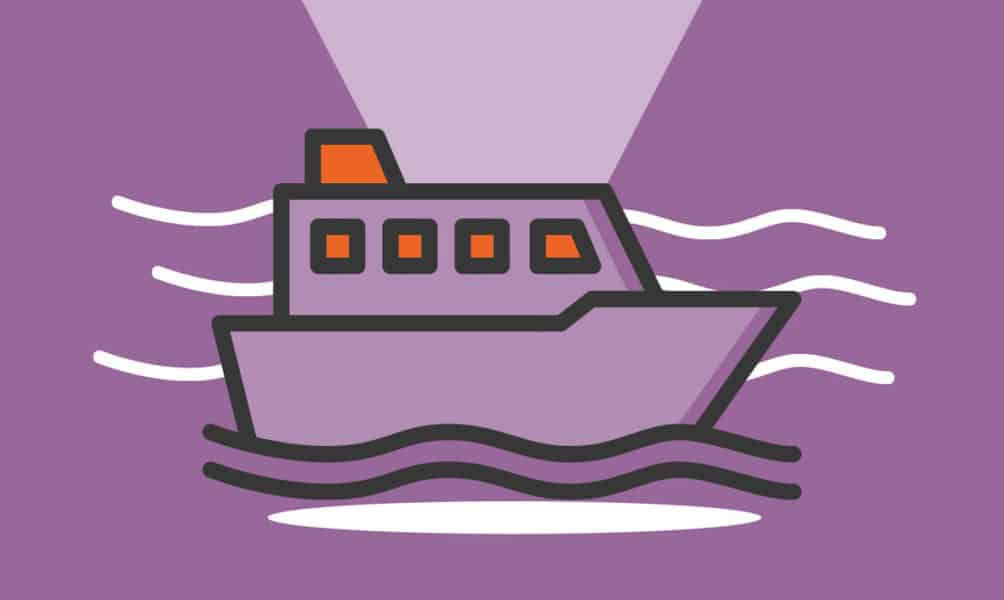
Investment range
$5,550 - $12,100
Revenue potential
$84,000 - $210,000 p.a.
Time to build
1 – 3 months
Profit potential
$60,000 - $150,000 p.a.
Industry trend
Have you ever dreamed of being a charter boat captain? The US private boating market is growing fast and a charter boat business offers broad opportunity, from a fishing charter business to a diving charter business, or even a yacht charter business. It’s an industry already worth more than three-quarters of a billion dollars, so there’s good money to be made. A significant investment is required, as boats don’t come cheap, but you can quickly start making it back.
Before you set sail, however, you’ll need to hone your entrepreneurial knowledge. Luckily, this step-by-step guide will teach you everything you need to know to get started and put you on course to building a successful boat charter business.
Looking to register your business? A limited liability company (LLC) is the best legal structure for new businesses because it is fast and simple.
Form your business immediately using ZenBusiness LLC formation service or hire one of the Best LLC Services .
Step 1: Decide if the Business Is Right for You
Pros and cons.
Starting a charter boat business has pros and cons to consider before deciding if it’s right for you.
- Good Money – Make $700 per day in-season
- Fun! – Be in the sun on the water all day
- Flexibility – Choose when to schedule trips
- Weather-Dependent – Cancelled trips due to extreme weather
- High Startup Costs – Boats are expensive
Charter boat industry trends
Industry size and growth.
- Industry size and past growth – The US private boat charter industry is worth nearly $780 million after impressive 15% growth in 2021.(( https://www.ibisworld.com/united-states/market-research-reports/private-boat-charters-industry/ ))
- Growth forecast – The US private boat charter industry is expected to grow steadily over the next five years.
- Number of businesses – In 2021, 807 private boat charter businesses were operating in the US.
- Number of people employed – In 2021, the private boat charter industry employed 2,482 people.
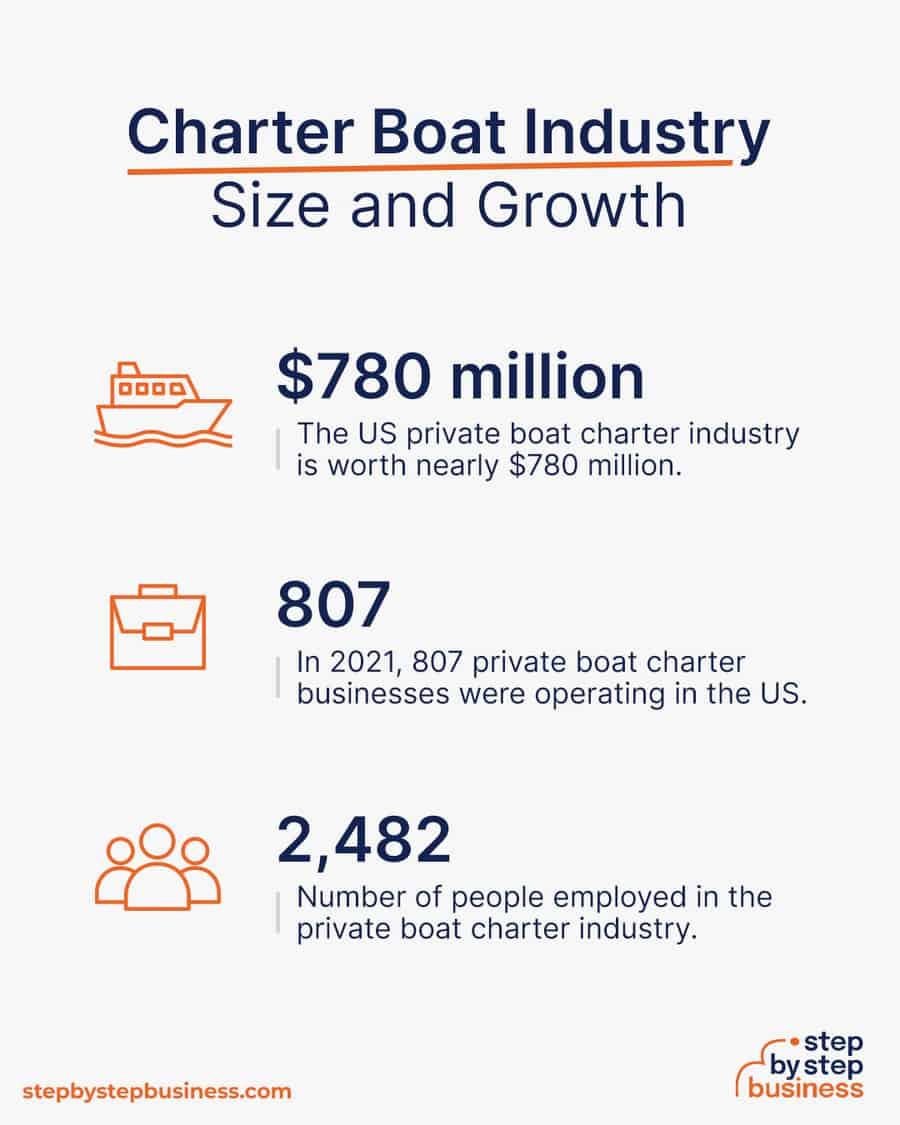
Trends and challenges
Trends in the boat charter industry include:
- Fishing charters are the most popular type of charter boat trips, presenting an opportunity for charter boat businesses to specialize.
- Boat safety features are improving, so a charter boat business that has all the latest safety features can have a competitive edge.
Challenges in the charter boat industry include:
- Rising fuel prices are cutting into the profit margins of charter boat businesses.
- Charter boat businesses need to constantly maintain their boats, a cost that is often underestimated.
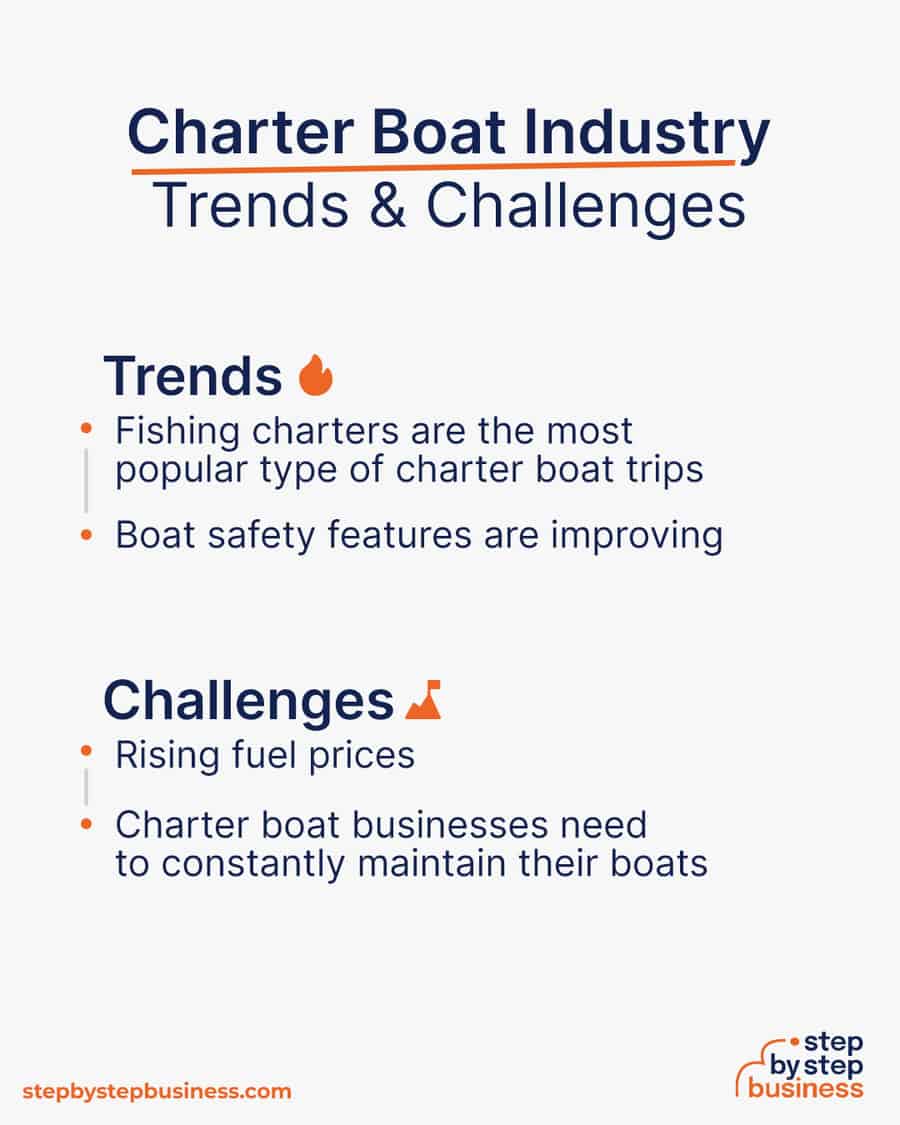
How much does it cost to start a charter boat business?
The startup costs for a charter boat business range from $5,500 to $12,000. The largest expense is for a down payment on a boat.
You’ll need a handful of items to successfully launch your charter boat business, including:
- Life jackets
- Fire extinguishers and other safety equipment
- Fishing equipment
How much can you earn from a charter boat business?
The average price for a one-day boat rental or charter is $700. Your profit margin after fuel and maintenance should be about 70%.
In your first year or two, you could do 120 one-day rentals per season, bringing in $84,000 in annual revenue. This would mean nearly $60,000 in profit, assuming that 70% margin. As your business gains traction, sales could climb to 300 trips in a year. With annual revenue of $210,000, you’d make a tidy profit of close to $150,000.
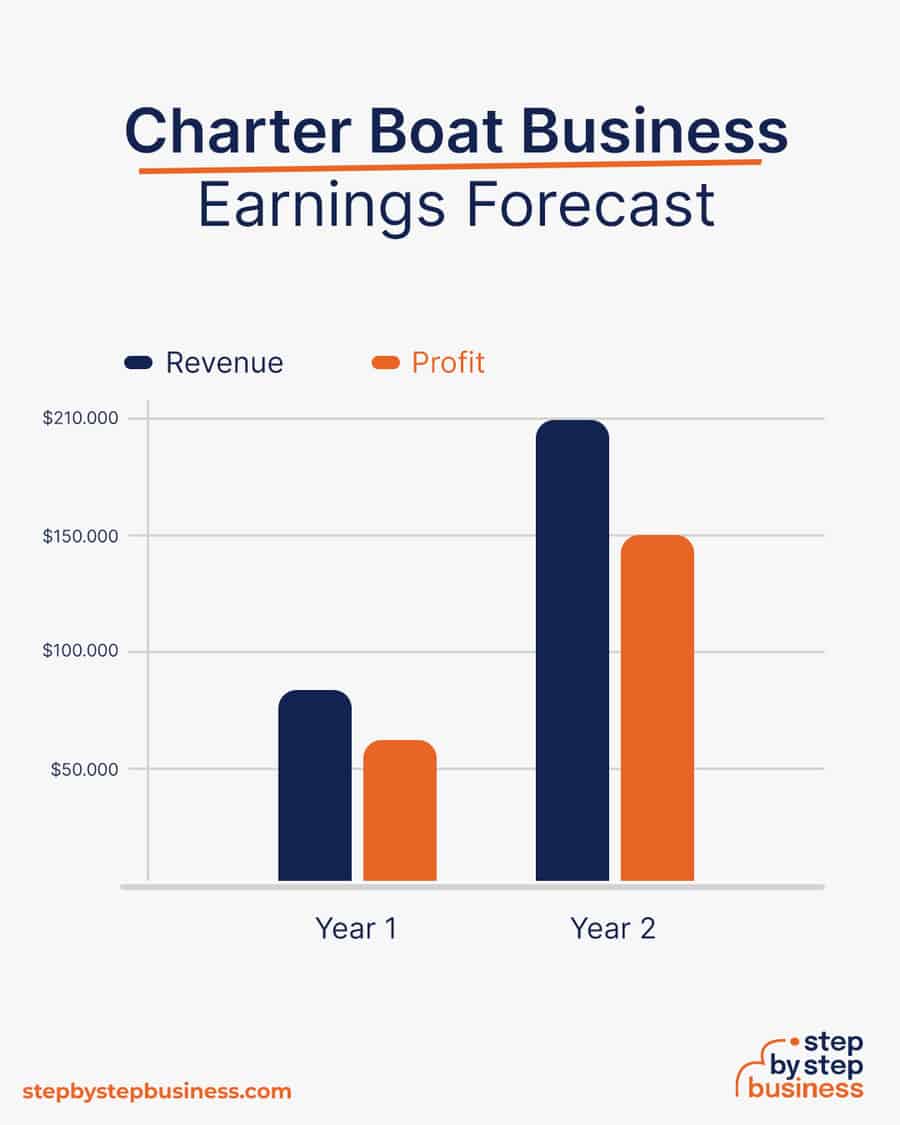
What barriers to entry are there?
There are a few barriers to entry for a charter boat business. Your biggest challenges will be:
- The cost of a down payment on a boat
- The boating skills required to be a charter boat captain
Related Business Ideas
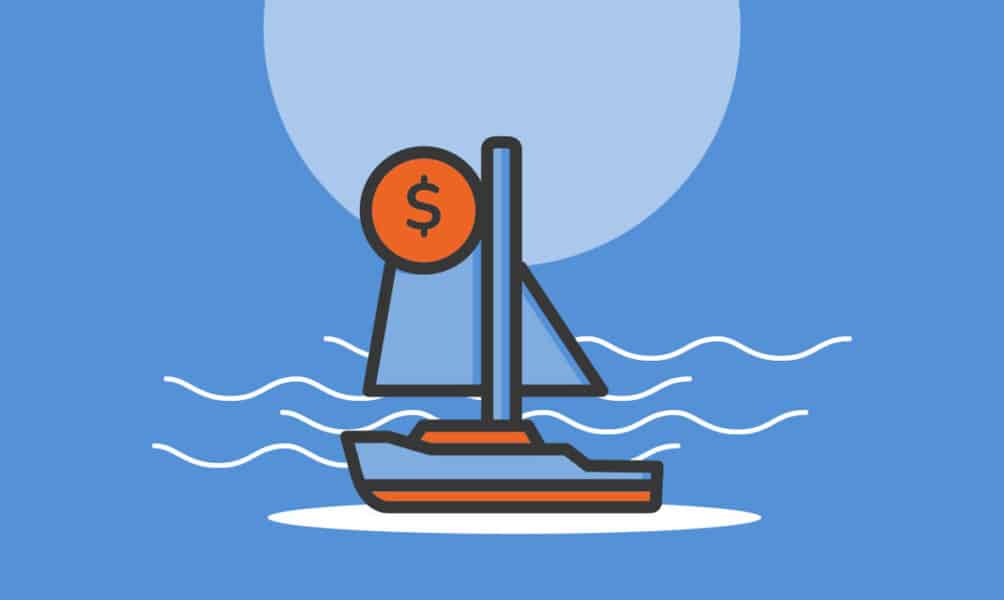
How to Start a Boat Rental Business

How to Start a Freight Forwarding Business

How to Start a Box Truck Business
Step 2: hone your idea.
Now that you know what’s involved in starting a charter boat business, it’s a good idea to hone your concept in preparation to enter a competitive market.
Choose a location for a charter boat business
When selecting a location for your charter boat business, it’s essential to weigh various factors:
- Market Demand : Research the local and tourist demand for charter boat services in potential locations. Look for areas with a high influx of tourists, especially those interested in activities like fishing, sightseeing, or water sports.
- Access to Water Bodies : The proximity to and accessibility of suitable water bodies (oceans, lakes, rivers) is crucial. Consider the types of activities your charter will offer and choose a location that supports these activities (e.g., deep-sea fishing requires access to the ocean).
- Marina Facilities : Evaluate the quality of marina facilities. Good mooring spots, maintenance services, fueling stations, and customer amenities are essential for the smooth operation of your business.
- Weather and Seasonality : Consider the climate and weather patterns. Areas with longer seasons of good weather can potentially offer more business days. However, also prepare for off-season business strategies.
- Customer Accessibility : Look at how easy it is for customers to reach your location. Proximity to tourist hotspots, hotels, and transport hubs can be advantageous.
- Economic Stability : The economic stability of the location can impact your business. Thriving economic areas with higher disposable incomes can be more lucrative.
- Local Partnerships and Networking : Explore potential partnerships with local businesses such as hotels, travel agencies, and event planners. These partnerships can provide a steady stream of customers.
- Scenic Appeal and Unique Offerings : Areas with natural beauty or unique marine life can attract more customers. Consider what unique features your location can offer that others can’t.
- Safety and Security : Ensure the location is safe for both customers and your business. This includes both on-water safety and the general safety of the area.
Why? Identify an opportunity
Research charter boat businesses in your area to examine their services, price points, and customer reviews. You’re looking for a market gap to fill. For instance, maybe the market is missing a charter boat business that offers dinner cruises or snorkeling and diving. A location with fewer existing charter services might offer more opportunities but consider if the low competition is due to poor demand.
You might consider targeting a niche market by specializing in a certain aspect of your industry, such as fishing or late night party cruises.
Your services will depend on the type of charters you decide to do. You can offer fishing charters or diving charters, late night cruises, local boat tours and more. You can also offer food and drinks.
How much should you charge for charter boats?
The average price for a day charter is $700. You should check prices in your area to make sure that you’re competitive. You should aim for a profit margin of about 70%.Once you know your costs, you can use this Step By Step profit margin calculator to determine your mark-up and final price points. Remember, the prices you use at launch should be subject to change if warranted by the market.
Who? Identify your target market
Your target market will be broad, mainly tourists. You should spread out your marketing to include sites like TikTok, Instagram, and Facebook.
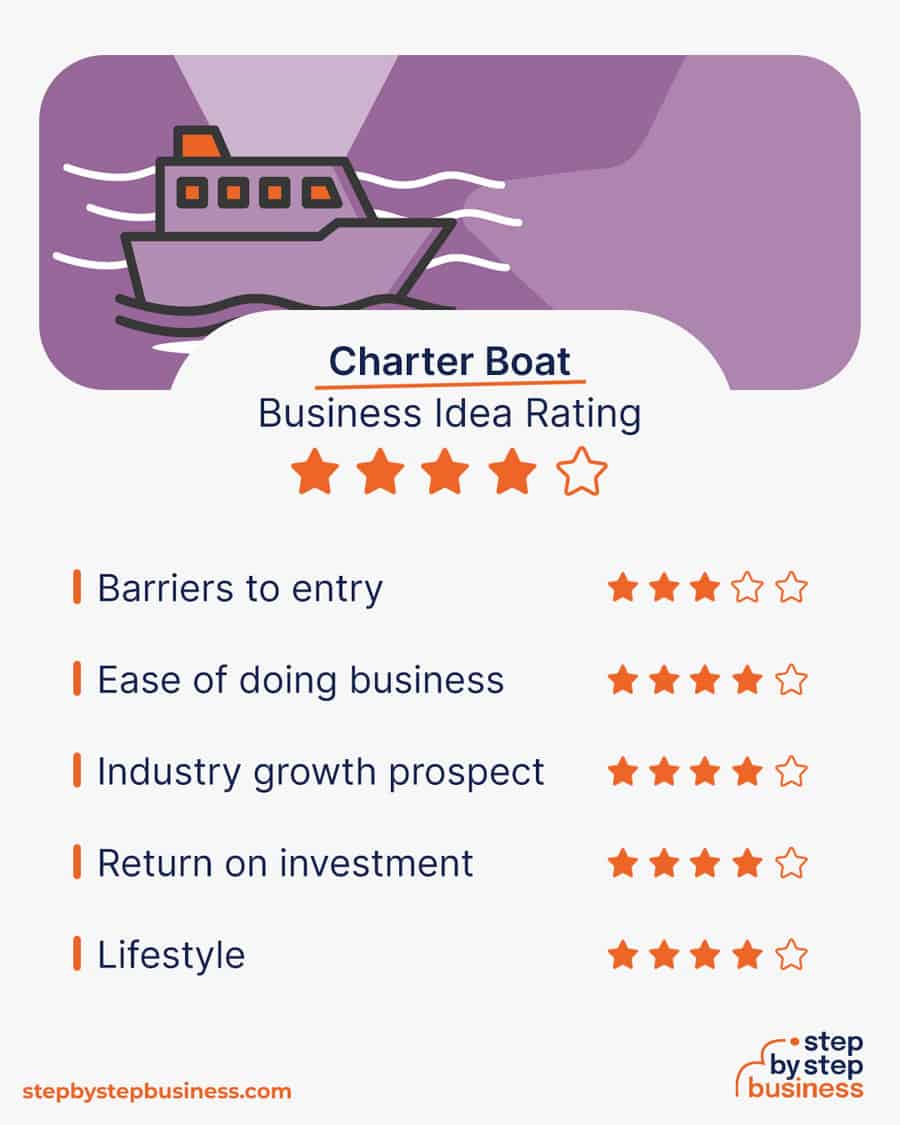
Step 3: Brainstorm a Charter Boat Business Name
Your business name is your business identity, so choose one that encapsulates your objectives, services, and mission in just a few words. You probably want a name that’s short and easy to remember, since much of your business, and your initial business in particular, will come from word-of-mouth referrals.
Here are some ideas for brainstorming your business name:
- Short, unique, and catchy names tend to stand out
- Names that are easy to say and spell tend to do better
- Name should be relevant to your product or service offerings
- Ask around — family, friends, colleagues, social media — for suggestions
- Including keywords, such as “charter boating” or “charter fishing”, boosts SEO
- Name should allow for expansion, for ex: “High Seas Charter Services” over “Scuba Diving Charters”
- Avoid location-based names that might hinder future expansion
Discover over 310 unique charter boat business name ideas here . If you want your business name to include specific keywords, you can also use our charter boat business name generator. Just type in a few keywords and hit “generate” and you’ll have dozens of suggestions at your fingertips.
Once you’ve got a list of potential names, visit the website of the US Patent and Trademark Office to make sure they are available for registration and check the availability of related domain names using our Domain Name Search tool. Using “.com” or “.org” sharply increases credibility, so it’s best to focus on these.
Find a Domain
Powered by GoDaddy.com
Finally, make your choice among the names that pass this screening and go ahead with domain registration and social media account creation. Your business name is one of the key differentiators that sets your business apart. Once you pick your company name, and start with the branding, it is hard to change the business name. Therefore, it’s important to carefully consider your choice before you start a business entity.
Step 4: Create a Charter Boat Business Plan
Every business needs a plan. This will function as a guidebook to take your startup through the launch process and maintain focus on your key goals. A business plan also enables potential partners and investors to better understand your company and its vision:
- Executive Summary: A brief overview highlighting the key points of the charter boat business plan, summarizing its objectives and potential.
- Business Overview: Detailed information about the charter boat business, including its mission, vision, and the problem it aims to solve in the market.
- Product and Services: Clearly defined offerings, specifying the types of charter boat services, packages, and any additional amenities provided.
- Market Analysis: An examination of the target market, identifying customer needs, market trends, and potential growth opportunities for the charter boat business.
- Competitive Analysis: Evaluation of competitors in the charter boat industry, highlighting strengths and weaknesses to position the business effectively in the market.
- Sales and Marketing: Strategies for promoting and selling charter boat services, including pricing, advertising, and promotional activities to attract customers.
- Management Team: Introduction of the key individuals responsible for running the charter boat business, emphasizing their expertise and roles.
- Operations Plan: Details on how the business will operate, covering logistics, maintenance, safety protocols, and any partnerships necessary for smooth operations.
- Financial Plan: Projections of the charter boat business’s financial performance, including revenue forecasts, expense estimates, and break-even analysis.
- Appendix: Supplementary materials, such as charts, graphs, or additional documentation, supporting and enhancing the information presented in the charter boat business plan.

If you’ve never created a business plan, it can be an intimidating task. You might consider hiring a business plan specialist to create a top-notch business plan for you.
Step 5: Register Your Business
Registering your business is an absolutely crucial step — it’s the prerequisite to paying taxes, raising capital, opening a bank account, and other guideposts on the road to getting a business up and running.
Plus, registration is exciting because it makes the entire process official. Once it’s complete, you’ll have your own business!
Choose where to register your company
Your business location is important because it can affect taxes, legal requirements, and revenue. Most people will register their business in the state where they live, but if you’re planning to expand, you might consider looking elsewhere, as some states could offer real advantages when it comes to charter boat businesses.
If you’re willing to move, you could really maximize your business! Keep in mind, it’s relatively easy to transfer your business to another state.
Choose your business structure
Business entities come in several varieties, each with its pros and cons. The legal structure you choose for your charter boat business will shape your taxes, personal liability, and business registration requirements, so choose wisely.
Here are the main options:
- Sole Proprietorship – The most common structure for small businesses makes no legal distinction between company and owner. All income goes to the owner, who’s also liable for any debts, losses, or liabilities incurred by the business. The owner pays taxes on business income on his or her personal tax return.
- General Partnership – Similar to a sole proprietorship, but for two or more people. Again, owners keep the profits and are liable for losses. The partners pay taxes on their share of business income on their personal tax returns.
- Limited Liability Company (LLC) – Combines the characteristics of corporations with those of sole proprietorships or partnerships. Again, the owners are not personally liable for debts.
- C Corp – Under this structure, the business is a distinct legal entity and the owner or owners are not personally liable for its debts. Owners take profits through shareholder dividends, rather than directly. The corporation pays taxes, and owners pay taxes on their dividends, which is sometimes referred to as double taxation.
- S Corp – An S-Corporation refers to the tax classification of the business but is not a business entity. An S-Corp can be either a corporation or an LLC , which just need to elect to be an S-Corp for tax status. In an S-Corp, income is passed through directly to shareholders, who pay taxes on their share of business income on their personal tax returns.

We recommend that new business owners choose LLC as it offers liability protection and pass-through taxation while being simpler to form than a corporation. You can form an LLC in as little as five minutes using an online LLC formation service. They will check that your business name is available before filing, submit your articles of organization , and answer any questions you might have.
Form Your LLC
Choose Your State
We recommend ZenBusiness as the Best LLC Service for 2023

Step 6: Register for Taxes
The final step before you’re able to pay taxes is getting an Employer Identification Number , or EIN. You can file for your EIN online or by mail or fax: visit the IRS website to learn more. Keep in mind, if you’ve chosen to be a sole proprietorship you can simply use your social security number as your EIN.
Once you have your EIN, you’ll need to choose your tax year. Financially speaking, your business will operate in a calendar year (January–December) or a fiscal year, a 12-month period that can start in any month. This will determine your tax cycle, while your business structure will determine which taxes you’ll pay.
The IRS website also offers a tax-payers checklist , and taxes can be filed online.
It is important to consult an accountant or other professional to help you with your taxes to ensure you’re completing them correctly.
Step 7: Fund your Business
Securing financing is your next step and there are plenty of ways to raise capital:
- Bank loans : This is the most common method but getting approved requires a rock-solid business plan and strong credit history.
- SBA-guaranteed loans : The Small Business Administration can act as guarantor, helping gain that elusive bank approval via an SBA-guaranteed loan .
- Government grants : A handful of financial assistance programs help fund entrepreneurs. Visit Grants.gov to learn which might work for you.
- Friends and Family : Reach out to friends and family to provide a business loan or investment in your concept. It’s a good idea to have legal advice when doing so because SEC regulations apply.
- Crowdfunding : Websites like Kickstarter and Indiegogo offer an increasingly popular low-risk option, in which donors fund your vision. Entrepreneurial crowdfunding sites like Fundable and WeFunder enable multiple investors to fund your business.
- Personal : Self-fund your business via your savings or the sale of property or other assets.
Bank and SBA loans are probably the best option, other than friends and family, for funding a charter boat business. You might also try crowdfunding if you have an innovative concept.

Step 8: Apply for Licenses and Permits
Starting a charter boat business requires obtaining a number of licenses and permits from local, state, and federal governments.
The US Coast Guard requires boat owners who run a charter to have a captain’s license. You can find information on getting this license with Maritime Professional Training . You may also need a fishing guide license.
Federal regulations, licenses, and permits associated with starting your business include doing business as (DBA), health licenses and permits from the Occupational Safety and Health Administration ( OSHA ), trademarks, copyrights, patents, and other intellectual properties, as well as industry-specific licenses and permits.
You may also need state-level and local county or city-based licenses and permits. This includes licenses, safety regulations, fishing limits, and environmental guidelines. The license requirements and how to obtain them vary, so check the websites of your state, city, and county governments or contact the appropriate person to learn more.
You could also check this SBA guide for your state’s requirements, but we recommend using MyCorporation’s Business License Compliance Package . They will research the exact forms you need for your business and state and provide them to ensure you’re fully compliant.
This is not a step to be taken lightly, as failing to comply with legal requirements can result in hefty penalties.
If you feel overwhelmed by this step or don’t know how to begin, it might be a good idea to hire a professional to help you check all the legal boxes.
Step 9: Open a Business Bank Account
Before you start making money, you’ll need a place to keep it, and that requires opening a bank account .
Keeping your business finances separate from your personal account makes it easy to file taxes and track your company’s income, so it’s worth doing even if you’re running your charter boat business as a sole proprietorship. Opening a business bank account is quite simple, and similar to opening a personal one. Most major banks offer accounts tailored for businesses — just inquire at your preferred bank to learn about their rates and features.
Banks vary in terms of offerings, so it’s a good idea to examine your options and select the best plan for you. Once you choose your bank, bring in your EIN (or Social Security Number if you decide on a sole proprietorship), articles of incorporation, and other legal documents and open your new account.
Step 10: Get Business Insurance
Business insurance is an area that often gets overlooked yet it can be vital to your success as an entrepreneur. Insurance protects you from unexpected events that can have a devastating impact on your business.
Here are some types of insurance to consider:
- General liability : The most comprehensive type of insurance, acting as a catch-all for many business elements that require coverage. If you get just one kind of insurance, this is it. It even protects against bodily injury and property damage.
- Business Property : Provides coverage for your equipment and supplies.
- Equipment Breakdown Insurance : Covers the cost of replacing or repairing equipment that has broken due to mechanical issues.
- Worker’s compensation : Provides compensation to employees injured on the job.
- Property : Covers your physical space, whether it is a cart, storefront, or office.
- Commercial auto : Protection for your company-owned vehicle.
- Professional liability : Protects against claims from a client who says they suffered a loss due to an error or omission in your work.
- Business owner’s policy (BOP) : This is an insurance plan that acts as an all-in-one insurance policy, a combination of the above insurance types.

Step 11: Prepare to Launch
As opening day nears, prepare for launch by reviewing and improving some key elements of your business.
Essential software and tools
Being an entrepreneur often means wearing many hats, from marketing to sales to accounting, which can be overwhelming. Fortunately, many websites and digital tools are available to help simplify many business tasks.
You may want to use industry-specific software, such as Sedna , Starboard Suite , or Stellar , to manage your bookings, scheduling, invoicing, and payments.
- Popular web-based accounting programs for smaller businesses include Quickbooks , Freshbooks , and Xero .
- If you’re unfamiliar with basic accounting, you may want to hire a professional, especially as you begin. The consequences for filing incorrect tax documents can be harsh, so accuracy is crucial.
Develop your website
Website development is crucial because your site is your online presence and needs to convince prospective clients of your expertise and professionalism.
You can create your own website using website builders . This route is very affordable, but figuring out how to build a website can be time-consuming. If you lack tech-savvy, you can hire a web designer or developer to create a custom website for your business.
They are unlikely to find your website, however, unless you follow Search Engine Optimization ( SEO ) practices. These are steps that help pages rank higher in the results of top search engines like Google.
For your charter boat business, the marketing strategy should focus on showcasing the unique experiences you offer, such as fishing trips, sightseeing tours, or private events. Emphasize the quality and safety of your vessels, the expertise of your crew, and the range of experiences available. The goal is to establish your charter as an unforgettable, enjoyable, and safe choice for individuals and groups seeking water-based adventures. Here are some powerful marketing strategies for your future business:
Kickstart Marketing
- Professional Branding : Ensure your branding reflects the adventure, luxury, or relaxation your charters offer, from your logo to your boat decor.
- Direct Outreach : Network with local hotels, travel agencies, and tourism boards to offer your charter services as part of travel packages or exclusive deals.
Digital Presence and Online Marketing
- Professional Website and SEO : Develop a visually appealing website that showcases your boats, services, and customer testimonials. Implement SEO best practices to optimize your site for relevant search terms related to charter boats, fishing trips, or scenic tours, depending on your niche.
- Social Media Engagement : Use platforms like Instagram, Facebook, and YouTube to post beautiful imagery of your boat trips, share customer experiences, and highlight the unique aspects of your services.
Content Marketing and Engagement
- Sea Adventures Blog : Share blog posts about the local marine environment, tips for a successful charter trip, fishing guides, or highlights of scenic tour routes.
- Customer Testimonials and Success Stories : Feature stories and reviews from satisfied customers, focusing on the memorable experiences they had during your charter trips.
- Video Tours and Guides : Create video content that showcases the beauty of the areas you tour, provides virtual tours of your vessels, or offers tips for first-time charter clients.
Experiential and In-Person Engagements
- Open Boat Days : Host days where potential customers can visit and tour your boats, meet the crew, and learn about your services.
- Participation in Local Events : Engage in local waterfront festivals, boat shows, and fishing tournaments to showcase your charter services and connect with potential customers.
Collaborations and Community
- Partnerships with Local Businesses : Collaborate with local businesses for mutual referrals, such as partnering with seaside restaurants for meal packages or accommodations for overnight charters.
- Community Involvement : Sponsor or participate in community environmental initiatives, emphasizing your commitment to marine conservation.
Customer Relationship and Loyalty Programs
- Loyalty Rewards : Offer repeat customers discounts or upgrades on future trips to encourage repeat business and referrals.
- Referral Incentives : Implement a referral program that rewards clients for bringing new customers to your charter service.
Promotions and Advertising
- Targeted Advertising : Use digital advertising on travel and tourism platforms, as well as local community boards, to reach potential clients.
- Email Marketing : Maintain engagement with past and potential clients through newsletters that include trip highlights, special offers, and updates about your services.
Focus on USPs
Unique selling propositions, or USPs, are the characteristics of a product or service that sets it apart from the competition. Customers today are inundated with buying options, so you’ll have a real advantage if they are able to quickly grasp how your charter boat business meets their needs or wishes. It’s wise to do all you can to ensure your USPs stand out on your website and in your marketing and promotional materials, stimulating buyer desire.
Global pizza chain Domino’s is renowned for its USP: “Hot pizza in 30 minutes or less, guaranteed.” Signature USPs for your charter boat business could be:
- Fishing day trips to reel in the big one!
- Dinner cruises to view the sunset in style
- Tour the local scenery relaxing on a luxury boat

You may not like to network or use personal connections for business gain. But your personal and professional networks likely offer considerable untapped business potential. Maybe that Facebook friend you met in college is now running a charter boat business, or a LinkedIn contact of yours is connected to dozens of potential clients. Maybe your cousin or neighbor has been working in boats for years and can offer invaluable insight and industry connections.
The possibilities are endless, so it’s a good idea to review your personal and professional networks and reach out to those with possible links to or interest in boating. You’ll probably generate new customers or find companies with which you could establish a partnership.
Step 12: Build Your Team
If you’re starting out small from a home office, you may not need any employees. But as your business grows, you will likely need workers to fill various roles. Potential positions for a charter boat business include:
- Charter Boat Drivers – drive on boat trips
- General Manager – scheduling, accounting
- Marketing Lead – SEO strategies, social media
At some point, you may need to hire all of these positions or simply a few, depending on the size and needs of your business. You might also hire multiple workers for a single role or a single worker for multiple roles, again depending on need. Free-of-charge methods to recruit employees include posting ads on popular platforms such as LinkedIn, Facebook, or Jobs.com. You might also consider a premium recruitment option, such as advertising on Indeed , Glassdoor , or ZipRecruiter . Further, if you have the resources, you could consider hiring a recruitment agency to help you find talent.
Step 13: Run a Charter Boat Business – Start Making Money!
What could be more fun than being the captain of your own ship and sharing the joy with your customers? You can make good money while spending your time in the sun on the water. You’ll need to make an investment to get started, but you’ll be stepping into an industry that’s growing fast. You’ve got the knowledge you need, now it’s time to go ahead and launch your boat and your successful new business.
- Charter Boat Business FAQs
With prices at $700 per party per day, you can make excellent money. As long as you’re in a good location and you’re knowledgeable about the area, you can be successful.
You can take various online courses to learn about boating through the Boat U.S. Foundation . Courses cost between $35 and $40. Hands on boating education requirements and providers for licensing purposes vary by state.
Like any business, starting a charter boat business is challenging. You should do plenty of research before deciding if it’s right for you.
Charter boat captain salaries vary by location. Salaries usually fall somewhere in the $60,000s.
Dream Yacht Charter is the largest charter boat company. They have nearly 1,000 boats in their fleet.
Leave a Reply Cancel reply
Your email address will not be published. Required fields are marked *
Save my name, email, and website in this browser for the next time I comment.
- Decide if the Business Is Right for You
- Hone Your Idea
- Brainstorm a Charter Boat Business Name
- Create a Charter Boat Business Plan
- Register Your Business
- Register for Taxes
- Fund your Business
- Apply for Licenses and Permits
- Open a Business Bank Account
- Get Business Insurance
- Prepare to Launch
- Build Your Team
- Run a Charter Boat Business - Start Making Money!
Subscribe to Our Newsletter
Featured resources.

21 Profitable Beach Business Ideas
David Lepeska
Published on July 21, 2022
So you live near a beach. Lucky you! You can go swimming or walk barefoot in the sand any time you like. Even better, you could also start abusiness ...

41 Outdoor Business Ideas
Carolyn Young
Published on July 13, 2022
Many major American businesses depend on outdoor activities, such as The North Face or Columbia. But there are also countless smaller businessesthat ...

18 Rental Business Ideas
Published on July 12, 2022
Businesses that rely on regular rental payments are guaranteed a steady stream of income, which is why so many of them draw so much entrepreneuriali ...
No thanks, I don't want to stay up to date on industry trends and news.
- EXPLORE Random Article
How to Start a Yacht Charter Business
Last Updated: January 13, 2020 References
wikiHow is a “wiki,” similar to Wikipedia, which means that many of our articles are co-written by multiple authors. To create this article, volunteer authors worked to edit and improve it over time. This article has been viewed 50,809 times.
The business of chartering a yacht comes with many responsibilities. Not only do you have to establish a plan of action for servicing your clients, you also need to cover your assets. Review the following list of steps if you are interested in learning how to start a yacht charter business.

Expert Q&A
You might also like.

- ↑ https://www.profitableventure.com/yacht-charter-business-plan/
- ↑ https://bizfluent.com/how-7934974-start-boat-rental-business.html
- ↑ https://www.entrepreneur.com/businessideas/boat-charters
- ↑ https://www.startupbizhub.com/how-to-start-a-luxury-yacht-business.htm
- ↑ https://www.smallbusiness.wa.gov.au/business-advice/marketing/8-steps-to-marketing-your-business
- https://careertrend.com/how-6008791-start-sailing-business.html
About this article
Did this article help you.

- About wikiHow
- Terms of Use
- Privacy Policy
- Do Not Sell or Share My Info
- Not Selling Info

Charter Boat Business Plan Template
Written by Dave Lavinsky

Charter Boat Business Plan
Over the past 20+ years, we have helped over 500 entrepreneurs and business owners create business plans to start and grow their charter boat companies. We have the experience, resources, and knowledge to help you create a great business plan.
In this article, you will learn some background information on why business planning is important. Then, you will learn how to write a charter boat business plan step-by-step so you can create your plan today.
Download our Ultimate Business Plan Template here >
What Is a Business Plan?
A business plan provides a snapshot of your charter boat business as it stands today, and lays out your growth plan for the next five years. It explains your business goals and your strategies for reaching them. It also includes market research to support your plans.
Why You Need a Business Plan
If you’re looking to start a charter boat business or grow your existing charter boat company, you need a business plan. A business plan will help you raise funding, if needed, and plan out the growth of your charter boat business to improve your chances of success. Your charter boat business plan is a living document that should be updated annually as your company grows and changes.
Sources of Funding for Charter Boat Businesses
With regards to funding, the main sources of funding for a charter boat business are personal savings, credit cards, bank loans, and angel investors. When it comes to bank loans, banks will want to review your business plan and gain confidence that you will be able to repay your loan and interest. To acquire this confidence, the loan officer will not only want to ensure that your financials are reasonable, but they will also want to see a professional plan. Such a plan will give them the confidence that you can successfully and professionally operate a business. Personal savings and bank loans are the most common funding paths for charter boat companies.
Finish Your Business Plan Today!
How to write a business plan for a charter boat business.
If you want to start a charter boat business or expand your current one, you need a business plan. The guide below details the necessary information for how to write each essential component of your charter boat business plan.
Executive Summary
Your executive summary provides an introduction to your business plan, but it is normally the last section you write because it provides a summary of each key section of your plan.
The goal of your executive summary is to quickly engage the reader. Explain to them the kind of charter boat business you are running and the status. For example, are you a startup, do you have a charter boat business that you would like to grow, or are you operating a chain of charter boat businesses?
Next, provide an overview of each of the subsequent sections of your plan.
- Give a brief overview of the charter boat industry.
- Discuss the type of charter boat business you are operating.
- Detail your direct competitors. Give an overview of your target customers.
- Provide a snapshot of your marketing strategy. Identify the key members of your team.
- Offer an overview of your financial plan.
Company Overview
In your company overview, you will detail the type of charter boat business you are operating.
For example, you might specialize in one of the following types of charter boat businesses:
- Sightseeing charter: This type of charter business specializes in taking people out on local waterways and providing a guided tour. This type of charter business works well in tourist destinations.
- Special event charter: This type of charter business provides charter services for special events such as weddings, corporate outings, and birthday parties.
- Whale watching charter: This type of charter business takes people out to see whales. Tour guides typically provide information about the types of ocean life that may be viewed.
- Fishing charter: This type of charter business specializes in taking people out fishing. Fishing lessons are often included.
- Yacht charter: A yacht charter is the rental of a private yacht, typically with a crew, for a specified duration to explore coastal or offshore destinations, providing a luxurious and customizable maritime experience.
In addition to explaining the type of charter boat business you will operate, the company overview needs to provide background on the business.
Include answers to questions such as:
- When and why did you start the business?
- What milestones have you achieved to date? Milestones could include the number of customers served, the number of charters completed, or reaching $X amount in revenue, etc.
- Your legal business Are you incorporated as an S-Corp? An LLC? A sole proprietorship? Explain your legal structure here.
Industry Analysis
In your industry or market analysis, you need to provide an overview of the charter boat industry.
While this may seem unnecessary, it serves multiple purposes.
First, researching the charter boat industry educates you. It helps you understand the market in which you are operating.
Secondly, market research can improve your marketing strategy, particularly if your analysis identifies market trends.
The third reason is to prove to readers that you are an expert in your industry. By conducting the research and presenting it in your plan, you achieve just that.
The following questions should be answered in the industry analysis section of your charter boat business plan:
- How big is the charter boat industry (in dollars)?
- Is the market declining or increasing?
- Who are the key competitors in the market?
- Who are the key suppliers in the market?
- What trends are affecting the industry?
- What is the industry’s growth forecast over the next 5 – 10 years?
- What is the relevant market size? That is, how big is the potential target market for your charter boat business? You can extrapolate such a figure by assessing the size of the market in the entire country and then applying that figure to your local population.
Customer Analysis
The customer analysis section of your charter boat business plan must detail the customers you serve and/or expect to serve.
The following are examples of customer segments: individuals, schools, families, and corporations.
As you can imagine, the customer segment(s) you choose will have a great impact on the type of charter boat business you operate. Clearly, individuals would respond to different marketing promotions than corporations, for example.
Try to break out your target customers in terms of their demographic and psychographic profiles. With regards to demographics, including a discussion of the ages, genders, locations, and income levels of the potential customers you seek to serve.
Psychographic profiles explain the wants and needs of your target customers. The more you can recognize and define these needs, the better you will do in attracting and retaining your customers.
Finish Your Charter Boat Business Plan in 1 Day!
Don’t you wish there was a faster, easier way to finish your business plan?
With Growthink’s Ultimate Business Plan Template you can finish your plan in just 8 hours or less!
Competitive Analysis
Your competitive analysis should identify the indirect and direct competitors your business faces and then focus on the latter.
Direct competitors are other charter boat businesses.
Indirect competitors are other options that customers have to purchase from that aren’t directly competing with your product or service. This includes other types of guided tours or recreation businesses as well as boat retailers. You need to mention such competition as well.
For each such competitor, provide an overview of their business and document their strengths and weaknesses. Unless you once worked at your competitors’ businesses, it will be impossible to know everything about them. But you should be able to find out key things about them such as
- What types of customers do they serve?
- What type of charter boat business are they?
- What is their pricing (premium, low, etc.)?
- What are they good at?
- What are their weaknesses?
With regards to the last two questions, think about your answers from the customers’ perspective. And don’t be afraid to ask your competitors’ customers what they like most and least about them.
The final part of your competitive analysis section is to document your areas of competitive advantage. For example:
- Will make it easier for customers to acquire your product or service?
- Will you offer products or services that your competition doesn’t?
- Will you provide better customer service?
- Will you offer better pricing?
Think about ways you will outperform your competition and document them in this section of your plan.
Marketing Plan
Traditionally, a marketing plan includes the four P’s: Product, Price, Place, and Promotion. For a charter boat business plan, your marketing strategy should include the following:
Product : In the product section, you should reiterate the type of charter boat company that you documented in your company overview. Then, detail the specific products or services you will be offering. For example, will you provide whale watching, fishing lessons, wedding services, or diving lessons?
Price : Document the prices you will offer and how they compare to your competitors. Essentially in the product and price sub-sections of your plan, you are presenting the products and/or services you offer and their prices.
Place : Place refers to the site of your charter boat company. Document where your company is situated and mention how the site will impact your success. For example, is your charter boat business located in a busy retail district, a business district, or a standalone shop? Discuss how your site might be the ideal location for your customers.
Promotions : The final part of your charter boat marketing plan is where you will document how you will drive potential customers to your location(s). The following are some promotional methods you might consider:
- Advertise in local papers, radio stations and/or magazines
- Reach out to websites
- Distribute flyers
- Engage in email marketing
- Advertise on social media platforms
- Improve the SEO (search engine optimization) on your website for targeted keywords
Operations Plan
While the earlier sections of your business plan explained your goals, your operations plan describes how you will meet them. Your operations plan should have two distinct sections as follows.
Everyday short-term processes include all of the tasks involved in running your charter boat business, including answering calls, planning and providing tours, billing and collecting payments from customers, etc.
Long-term goals are the milestones you hope to achieve. These could include the dates when you expect to book your Xth charter, or when you hope to reach $X in revenue. It could also be when you expect to expand your charter boat business to a new city.
Management Team
To demonstrate your charter boat business’ potential to succeed, a strong management team is essential. Highlight your key players’ backgrounds, emphasizing those skills and experiences that prove their ability to grow a company.
Ideally, you and/or your team members have direct experience in managing charter boat businesses. If so, highlight this experience and expertise. But also highlight any experience that you think will help your business succeed.
If your team is lacking, consider assembling an advisory board. An advisory board would include 2 to 8 individuals who would act as mentors to your business. They would help answer questions and provide strategic guidance. If needed, look for advisory board members with experience in managing a charter boat business or running a small whale watching operation.
Financial Plan
Your financial plan should include your 5-year financial statement broken out both monthly or quarterly for the first year and then annually. Your financial statements include your income statement, balance sheet, and cash flow statements.
Income Statement
An income statement is more commonly called a Profit and Loss statement or P&L. It shows your revenue and then subtracts your costs to show whether you turned a profit or not.
In developing your income statement, you need to devise assumptions. For example, will you have 5 boats in your fleet, and will you offer 3 tours per boat/per day? And will sales grow by 2% or 10% per year? As you can imagine, your choice of assumptions will greatly impact the financial forecasts for your business. As much as possible, conduct research to try to root your assumptions in reality.
Balance Sheets
Balance sheets show your assets and liabilities. While balance sheets can include much information, try to simplify them to the key items you need to know about. For instance, if you spend $50,000 on building out your charter boat business, this will not give you immediate profits. Rather it is an asset that will hopefully help you generate profits for years to come. Likewise, if a lender writes you a check for $50,000, you don’t need to pay it back immediately. Rather, that is a liability you will pay back over time.
Cash Flow Statement
Your cash flow statement will help determine how much money you need to start or grow your business, and ensure you never run out of money. What most entrepreneurs and business owners don’t realize is that you can turn a profit but run out of money and go bankrupt.
When creating your Income Statement and Balance Sheets be sure to include several of the key costs needed in starting or growing a charter boat business:
- Cost of equipment and supplies
- Payroll or salaries paid to staff
- Business insurance
- Other start-up expenses (if you’re a new business) like legal expenses, permits, computer software, and equipment
Attach your full financial projections in the appendix of your plan along with any supporting documents that make your plan more compelling. For example, you might include your charter permit, or testimonials from happy customers.
Writing a business plan for your charter boat business is a worthwhile endeavor. If you follow the template above, you will be well-prepared to create a fishing charter business plan, yacht charter business plan or a boat charter business plan. You will understand the charter boat industry, your competition, and your customers. You will develop a marketing strategy and will understand what it takes to launch and grow a successful charter boat business.
Charter Boat Business Plan Template FAQs
What is the easiest way to complete my charter boat business plan.
Growthink's Ultimate Business Plan Template allows you to quickly and easily write your charter boat business plan.
How Do You Start a Charter Boat Business?
Starting a charter boat business is easy with these 14 steps:
- Choose the Name for Your Charter Boat Business
- Create Your Charter Boat Business Plan
- Choose the Legal Structure for Your Charter Boat Business
- Secure Startup Funding for Charter Boat Business (If Needed)
- Secure a Location for Your Business
- Register Your Charter Boat Business with the IRS
- Open a Business Bank Account
- Get a Business Credit Card
- Get the Required Business Licenses and Permits
- Get Business Insurance for Your Charter Boat Business
- Buy or Lease the Right Charter Boat Business Equipment
- Develop Your Charter Boat Business Marketing Materials
- Purchase and Setup the Software Needed to Run Your Charter Boat Business
- Open for Business
Don’t you wish there was a faster, easier way to finish your Charter Boat business plan?
OR, Let Us Develop Your Plan For You
Since 1999, Growthink has developed business plans for thousands of companies who have gone on to achieve tremendous success. Click here to see how a Growthink business plan consultant can create your business plan for you.
Other Helpful Business Plan Articles & Templates

Create Your Corporation
How to Start Your Own Charter Boat Business: A Complete Guide
Everything you need to know to start your own charter boat business. A step-by-step guide covering licenses, permits, business plans, financing, boat selection, marketing and more.
In this post, we'll cover everything you need to know to start your own charter boat business: •Determining the type of charter boat business you want to run •Obtaining the proper licenses and permits •Purchasing or leasing a boat •Recruiting a crew •Marketing your new charter boat business •Tips for keeping your customers happy and building a loyal base of clients
The Charter Boat Business Market
According to Ibisworld , the U.S. fishing boat charter market has a market cap of $364.9 million.
Local charter boats typically cater to customers within a specific region, offering fishing trips, whale watching tours, snorkeling excursions and other recreational activities. These businesses usually target middle-income customers and families looking for an affordable charter experience. Luxury charter boats provide an upscale experience for high-net-worth individuals. Services often include yacht charters, crewed catamaran cruises to exotic locations, and big-game fishing adventures. Luxury charters charge a premium and aim to provide a highly customized, concierge-level experience. Mass market charter boats appeal to a large segment of recreational boaters and tourists. They offer more basic sightseeing, snorkeling and fishing trips at lower price points. Mass market charters make up the largest portion of the overall charter boat industry.
Your Charter Boat Product and Service
•Fishing charters: Take customers out for a day of deep sea fishing or inshore fishing. Provide all necessary gear and bait to help them land the big catch. •Sightseeing cruises: Offer scenic tours along the coastline or to nearby islands. This works well for whale watching, bird watching, sunset cruises and more. •Snorkeling and scuba excursions: Take snorkelers and certified scuba divers to secluded reefs and shipwrecks to explore the underwater world. •Yacht charters: For a luxury charter business, provide fully crewed yacht charters for vacations and special events. To stand out, focus on a specific type of experience and do it extremely well. Develop packages and tours that showcase the best your region has to offer. Provide any necessary gear or equipment to make the experience high-quality and hassle-free for your customers. Deliver your services directly from your charter boat, with you and your crew taking customers out on the water for their chosen activities. Build strong relationships with your customers through friendly service and a memorable experience out at sea. Developing a loyal base of repeat clients and word-of-mouth marketing will be key to your success.
Economics and Finances
•Boat purchase or lease: The boat itself, whether purchased new or used, will be your largest upfront cost. Boat leases are also common and help minimize initial capital outlay. •Docking and mooring fees: Fees for keeping your boat in a marina or harbor when not in use. •Fuel: Fuel for powering your boat and generators. Fuel costs can be significant, especially for larger charter boats. •Maintenance: Ongoing costs for repairs, cleaning, insurance, licensing, and general upkeep. •Staff: Captains, crew members, and office staff to help run tours and assist customers. •Supplies: Equipment, bait, food and drinks, safety gear, and any other consumables for your tours. •Insurance: Liability and hull insurance to properly insure your business and protect against unforeseen circumstances. •Marketing: Advertising and promotional costs to build awareness of your charter boat business. To price your tours, determine your costs for each type of excursion and add a markup of at least 30-50% to generate a profit. Offer package deals and discounts during off-peak seasons to boost sales. Luxury charters can charge a much higher premium, often 2-3 times the rate of a standard fishing or sightseeing tour. Conduct research on competitor pricing in your area to properly position your business in the market. You want to be in line with the going rates for the experiences and services you provide. Price too low and you won't generate enough profit. Price too high and you risk losing potential customers to competitors.
Marketing Your Charter Boat Business
•Search engine optimization (SEO): Optimize your website and listings on sites like Google My Business, TripAdvisor and Yelp to rank higher in search results. Focus on keywords like "charter boat tours" and "fishing charters" along with your location. •Social media marketing: Create profiles on Facebook, Instagram and YouTube to raise awareness of your business. Post photos and videos of your boat, crew and happy customers enjoying their charter experience. Engage with followers by replying to their comments and messages. •Email marketing: Build an email list from your website and social media followers. Send regular newsletters with tour promotions, schedules, and behind-the-scenes updates. Offer subscribers first access to new tour dates or flash sales. •Direct mail: For local customers, send postcards or flyers in the mail advertising your services. Include coupons or promotional codes to track responses. •Online advertising: Run targeted ads on social media and search engines to reach potential customers in your area. Facebook ads and Google Ads allow you to specify location, interests, and keywords to effectively target the right audiences. •Partnerships: Work with local hotels, resorts, and activity providers to cross-promote your business. Offer discounts or commissions for referrals. List your tours on regional tourism websites and with concierge associations to gain more exposure. •Word-of-mouth: Don't underestimate the power of recommendations from happy customers. Provide exceptional service and experiences to turn first-time clients into loyal advocates for your charter boat business. Their genuine reviews and referrals are the most effective form of marketing.
Sales Strategies and Processes
•Online booking: Make it easy for customers to view your tour options and schedules, check availability, and book directly on your website. Offer a simple and streamlined booking process. •Phone reservations: Have a reservation phone line so customers can call to ask questions, inquire about custom or private tour options, and book over the phone if they prefer. •In-person sales: If you have a physical office location or storefront, have your staff available to assist walk-in customers with booking tours. This personal interaction can help close sales and build strong relationships. •Pre-selling tours: Allow customers to book tours in advance, especially for popular dates and times. This helps ensure you have enough bookings to make the trip worthwhile and gives you an accurate count of participants ahead of time. •Upselling: Once a customer books a tour, upsell them on package deals, annual passes, gift cards, and other add-ons to increase the value of the sale. For example, if they book a fishing charter, offer a discount on a sightseeing cruise for their next visit. •Special promotions: Run limited-time promotions and flash sales on your website and social media to boost tour bookings during off-peak days or seasons. Cross-promote with partner businesses to reach new potential customers. •Relationship building: Provide exceptional service and experiences to turn first-time clients into loyal, repeat customers. Engage with them on social media, send personalized thank you notes after their tour, and keep them up to date on new offerings or special promotions. Repeat customers and word-of-mouth referrals are the foundation of sales for a charter boat business. •Seasonal planning: Know which types of tours and experiences will be most in demand at different times of the year. Plan your schedules and availability accordingly to maximize sales during peak seasons. Offer off-season specials and promotions to sustain business year-round.
Operations and Execution
•Develop efficient processes for booking tours, checking in customers, setting up equipment, and getting out on the water. Practice and refine these procedures with your crew to minimize wasted time and ensure a seamless experience for clients. •Maintain high safety standards. Conduct regular inspections and maintenance on your boat and equipment. Train crew members in CPR and first aid. Have life jackets, flares, fire extinguishers, and other safety gear readily available in case of emergencies. •Build a knowledgeable, personable crew. Hire captains and crew members with experience in your chosen activities like fishing, sailing or diving. Conduct training to familiarize them with your boat and business procedures. Crew members should provide friendly service and be able to educate and assist customers. •Keep your boat and equipment in pristine condition. Schedule routine cleanings, repairs, and restocking of gear or bait after every tour. Make any necessary upgrades to fixtures, electronics or amenities to provide the best possible experience for your target customers. •Develop strong partnerships with local vendors. Work with bait shops, gear suppliers, harbormasters, and tourism promoters. Negotiate discounts or commissions in exchange for referrals and cross-promotion. These partnerships can help reduce costs and increase new customer acquisition. •Plan your tour schedules and availability carefully based on seasonality. Know which types of excursions will be most in demand at different times of the year. Adjust staffing levels and frequency of tours to match seasonal fluctuations. •Provide exceptional customer service. From the initial booking inquiry to the follow-up after their tour, deliver friendly and helpful service to keep clients satisfied and build loyalty. Personalize interactions, share your local knowledge, and make every client feel like a VIP. Word-of-mouth marketing from happy customers will drive repeat business and new referrals.
Legal Requirements and Regulations
Check with local port authorities, the coast guard, fish and wildlife agencies, and tourism boards to determine all licenses and permits you will need. Regulations cover boat size, engine power, waste disposal, fishing seasons, and more. It is critical to comply with all regulations to legally and safely operate your charter boat business. Failure to do so can result in heavy fines, license suspension, or being barred from taking customers out on the water.

Set Sail on Your Charter Boat Business Adventure
Do your research, obtain the proper licenses, purchase a suitable boat, and hire an experienced crew. Market your services, optimize your booking processes, and plan tours and availability based on seasonal demand. Keep safety, maintenance and customer satisfaction as top priorities. While running a charter boat business is challenging work, the thrill of being out on the open water, watching your customers reel in a big catch or witness a pod of whales, makes it worthwhile. With time and dedication, you can build a successful charter boat company and turn your love of the sea into a flourishing career. So set sail on your new business adventure - the opportunities are as vast as the horizon!
Transportation & Logistics
How to launch your own air freight business, how to start a successful last mile delivery business: a complete guide, how to start a thriving door to door delivery business.
Charter Boat Business Plan Template
Written by Dave Lavinsky
Charter Boat Business Plan
You’ve come to the right place to create your Charter Boat business plan.
We have helped over 1,000 entrepreneurs and business owners create business plans and many have used them to start or grow their Charter Boat companies.
Below is a template to help you create each section of your Charter Boat business plan.
Executive Summary
Business overview.
La La Land Charters, located in Los Angeles, is a new charter boat company that offers a small fleet of boats that can be rented by the hour or day. Our fleet includes yachts, catamarans, sailboats, and motorboats. Some of our rentals include free amenities, such as wifi hotspot and a full kitchen. We aim to offer the residents and tourists of LA the most luxurious boat chartering experience that they could dream of.
La La Land Charters is run by Joseph Stuckman, who is an experienced charter boat captain with 20 years of experience. While Joseph Stuckman has never run his own company before, he has vast experience and first-hand knowledge of how to run a successful charter boat business from his time working for a local charter boat tour company.
Product Offering
La La Land Charters will provide the following different types of charters:
- Bareboat charters that allow experienced sailors to rent the boat and sail themselves
- Skippered charters for the novice sailor or for a relaxed sailing experience
- Full crew charters that provide meals, lodging, and activities
- Party and corporate event charters complete with a full crew to provide all the planning, accommodations, and activities for special events onboard the yacht
Customer Focus
La La Land Charters will primarily serve residents and tourists within a 30-mile radius of Los Angeles. We expect much of our target market to be affluent and have the disposable income to charter a boat. We also expect much of our target market to board our boats in large groups, such as for family gatherings, parties, or corporate events.
Management Team
La La Land Charters is a family-owned and operated charter boat business that is owned by Joseph Stuckman and his immediate family members. The business will be managed by Joseph Stuckman and his son David. Joseph Stuckman is an experienced charter boat captain who has been working in the charter boat industry for more than 20 years as a skipper and tour guide. While Joseph Stuckman has never run his own company before, he has vast experience and first-hand knowledge of how to run a successful charter boat business from his time working for a local charter boat tour company.
Success Factors
La La Land Charters will be able to achieve success by offering the following competitive advantages:
- Location: La La Land Charters’s location is adjacent to a popular tourist destination and a busy shopping district with lots of foot traffic.
- Customer-oriented service: La La Land Charters will have a full-time assistant to keep in contact with clients and answer their everyday questions. The management team realizes the importance of accessibility to their customers, and will further keep in touch with their customers through monthly newsletters on topics of interest.
- Management: The founder has been extremely successful working in this industry and will be able to use his previous experience to craft customized charter boat tours that suit a variety of customer preferences.
- Relationships: Having lived in the community for 35 years, the founder knows many of the local leaders, newspapers, and other influences in the area.
Financial Highlights
La La Land Charters is seeking a total funding of $3,000,000 of debt capital to open its charter boat company.
- Dock and office design/build: $1,500,000
- Equipment and supplies: $1,000,000
- Three months of overhead expenses (payroll, rent, utilities): $300,000
- Marketing costs: $100,000
- Working capital: $100,000
The following graph below outlines the pro forma financial projections for La La Land Charters.
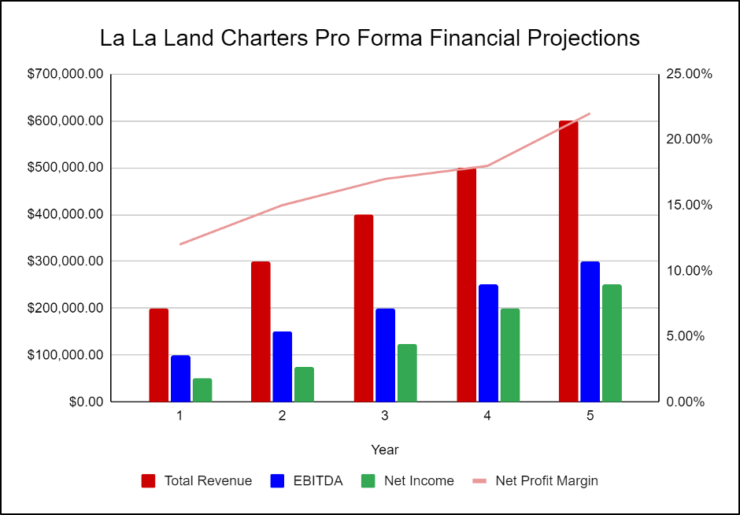
Company Overview
Who is la la land charters, la la land charters’ history.
Joseph Stuckman began researching what it would take to build his own charter boat company and did a thorough analysis of the costs, market, demographics, and competition. Once his market analysis was complete, Joseph began surveying local vacant office spaces to establish the charter boat rental office. He has secured a space on the water to build his own dock and house his fleet of charter boats. Joseph Stuckman incorporated La La Land Charters as a Limited Liability Corporation in January 2023.
Since incorporation, the company has achieved the following milestones:
- Secured space on the water to build the dock and house the fleet of boats.
- Located available office space for rent that is close to the port.
- Developed the company’s name, logo, and website.
- Hired a general contractor for the build-out of the office and dock.
- Determined equipment and necessary supplies.
- Began recruiting key employees.
La La Land Charters’ Services
Industry analysis.
The global private charter boat industry is a $6.5 billion market. The market is composed of industry operators that charter private boats for individuals and groups.
This industry can be segmented by type of charter boat. There are many boats that can be used including sailboats, motor yachts, party boats, catamarans, and more. One of the most popular segments is yacht charter. Some industry operators rent out their boats. Others provide scenic tours and sightseeing services.
Increasing levels of participation in recreational boating activities in the United States are expected to help boost market demand for private charter boat services over the next five years. In fact, according to Fortune Business Insights, the industry is expected to grow at a CAGR of 6.6% from now until 2027. Market drivers include rising disposable incomes, increased interest in recreation and leisure activities, and a rebound in tourism.
However, due to increasing levels of competition among industry operators in prime tourist destinations, maintaining a competitive advantage can be a challenge for new entrants. For this reason, new industry operators can differentiate themselves by catering to a specific niche market, developing a unique branding strategy, and providing exceptional service.
Customer Analysis
Demographic profile of target market.
La La Land Charters will serve the community residents and tourists in Los Angeles and its surrounding areas.
The precise demographics for Los Angeles, California are:
Customer Segmentation
La La Land Charters will primarily target the following customer profiles:
Competitive Analysis
Direct and indirect competitors.
La La Land Charters will face competition from other companies with similar business profiles. A description of each competitor company is below.
Ocean Champion Charter Co.
Ocean Champion Charter Co. is a charter boat company in Los Angeles. In business for over 50 years, Ocean Champion Charter Co. offers bareboat charter rentals to experienced sailors in the area. Sailors can choose from a large fleet of charter boats including yachts, sailboats, motor boats, and catamarans in multiple models and sizes. This charter company rents out its boats for the day or the week.
Although this charter boat company is a top choice for many sailing enthusiasts around the area, it caters to skilled sailors and does not offer options like skippered boats or crew-led tours that the general population can enjoy.
Calming Charter Boats
Calming Charter Boats is another local charter boat rental business. The company is mostly known for its sailing yacht charters and whale-watching tours. They are a full-service option for any skill level from the captain to the novice sailor. Calming Charter Boats provides skippered tours, group charters, and corporate event hosting on its premier yachts.
Although this company provides a wide range of services and charter options, its fleet is composed entirely of sailing yachts. It does not have any other type of boat for customers to choose from. Additionally, this is the most expensive charter company of all the competitors.
Charlie Charter Boats
Charlie Charter Boats is also a local charter boat company that offers a variety of charter boat rental options. This charter boat company opened in 2017 and has since grown to become one of the most popular charter boat options in the area. Charlie Charter Boats offers fully-crewed boat tours to multiple destinations in the region for groups and families. The company also provides bareboat rentals for skilled sailors who prefer to man the boat themselves. Charlie Charter Boats has a fleet of 17 boats including yachts, sailboats, and motorboats.
Competitive Advantage
La La Land Charters will be able to offer the following advantages over their competition:
Marketing Plan
Brand & value proposition.
La La Land Charters will offer a unique value proposition to its clientele:
- Convenient and attractive location
- Charter boat rentals that suit a wide range of preferences
- Affordable and high-quality charter boat rentals
- Providing excellent customer service
Promotions Strategy
The promotions strategy for La La Land Charters is as follows:
Social Media
La La Land Charters will invest heavily in a social media advertising campaign. The brand manager will create the Company’s social media accounts and invest in ads on all social media platforms. It will use targeted marketing to appeal to the target demographics.
Website/SEO
La La Land Charters will invest heavily in developing a professional website that displays all of the features and benefits of the charter boat company. It will also invest heavily in SEO so that the brand’s website will appear at the top of search engine results.
Special Offers
Offers and incentives are an excellent approach to assisting businesses in replenishing the churn in their customer base that they lose each year. The company will introduce special offers to attract new consumers and encourage repeat business which will be quite advantageous in the long run.
Sponsorships
La La Land Charters will also invest in sponsoring certain events so that their banners and collateral material are displayed all over events that numerous people attend.
La La Land Charters’ pricing will be moderate so consumers feel they receive great value when purchasing charter boat rentals.
Operations Plan
The following will be the operations plan for La La Land Charters.
Operation Functions:
- Joseph will be the Owner of La La Land Charters. He will oversee the general operations of the company. He will also help captain the boats when it is needed for particular rentals.
- David, Joseph’s son, will be the Office Manager who will manage all aspects of the rental office.
- Olivia Stuckmann, Joseph’s wife, will be his full-time assistant. She will answer phones, manage rental bookings, and oversee other administrative tasks for the company.
- Joseph will hire several other captains and skippers to help drive and manage the boats during bookings.
- Joseph will also hire an on-call maintenance professional who will ensure each boat is in perfect working order before every booking.
Milestones:
La La Land Charters will have the following milestones completed in the next six months.
- 3/202X Finalize lease agreement
- 4/202X Build out dock and purchase boats for fleet
- 5/202X Hire and train initial staff
- 6/202X Kickoff of promotional campaign
- 7/202X Launch La La Land Charters
- 8/202X Reach break-even
Financial Plan
Key revenue & costs.
La La Land Charters’ revenues will come primarily from its charter boat rental fees.
The office lease, equipment, supplies, marketing expenses, and labor expenses will be the key cost drivers of La La Land Charters.
Funding Requirements and Use of Funds
Key assumptions.
The following outlines the key assumptions required in order to achieve the revenue and cost numbers in the financials and pay off the startup business loan.
- Average annual maintenance costs: $100,000
- Average fee per charter: $2000
Financial Projections
Income statement, balance sheet, cash flow statement, charter boat business plan faqs, what is a charter boat business plan.
A charter boat business plan is a plan to start and/or grow your charter boat business. Among other things, it outlines your business concept, identifies your target customers, presents your marketing plan and details your financial projections.
You can easily complete your Charter Boat business plan using our Charter Boat Business Plan Template here .
What are the Main Types of Charter Boat Businesses?
There are a number of different kinds of charter boat businesses , some examples include: Sightseeing charter, Special event charter, Whale watching charter, and Fishing charter.
How Do You Get Funding for Your Charter Boat Business Plan?
Charter Boat businesses are often funded through small business loans. Personal savings, credit card financing and angel investors are also popular forms of funding.
What are the Steps To Start a Charter Boat Business?
Starting a charter boat business can be an exciting endeavor. Having a clear roadmap of the steps to start a business will help you stay focused on your goals and get started faster.
1. Develop A Charter Boat Business Plan - The first step in starting a business is to create a detailed charter boat business plan that outlines all aspects of the venture. This should include potential market size and target customers, the services or products you will offer, pricing strategies and a detailed financial forecast.
2. Choose Your Legal Structure - It's important to select an appropriate legal entity for your charter boat business. This could be a limited liability company (LLC), corporation, partnership, or sole proprietorship. Each type has its own benefits and drawbacks so it’s important to do research and choose wisely so that your charter boat business is in compliance with local laws.
3. Register Your Charter Boat Business - Once you have chosen a legal structure, the next step is to register your charter boat business with the government or state where you’re operating from. This includes obtaining licenses and permits as required by federal, state, and local laws.
4. Identify Financing Options - It’s likely that you’ll need some capital to start your charter boat business, so take some time to identify what financing options are available such as bank loans, investor funding, grants, or crowdfunding platforms.
5. Choose a Location - Whether you plan on operating out of a physical location or not, you should always have an idea of where you’ll be based should it become necessary in the future as well as what kind of space would be suitable for your operations.
6. Hire Employees - There are several ways to find qualified employees including job boards like LinkedIn or Indeed as well as hiring agencies if needed – depending on what type of employees you need it might also be more effective to reach out directly through networking events.
7. Acquire Necessary Charter Boat Equipment & Supplies - In order to start your charter boat business, you'll need to purchase all of the necessary equipment and supplies to run a successful operation.
8. Market & Promote Your Business - Once you have all the necessary pieces in place, it’s time to start promoting and marketing your charter boat business. This includes creating a website, utilizing social media platforms like Facebook or Twitter, and having an effective Search Engine Optimization (SEO) strategy. You should also consider traditional marketing techniques such as radio or print advertising.
Learn more about how to start a successful charter boat business:
- How to Start a Charter Boat Business

Running a Sailing Charter Business – Top Ten Tips
Unique boat – get out there and be seen.
Traditional boats, yachts and tall ships are all extremely different not only from one another but also from modern white fibre glass boats. We never put down modern yachts as many of our customers sail them, but we do point out the differences.
Your first decision has to be; is this vessel be attractive or capable of being made attractive?
You might want to consider how else the vessel can stand out from the crowd. Pilot Cutters would carry their pilot number or port initials to be recognised. We were one of the first pilot cutter replicas to choose a short name and put ‘Eve’ name on the sail. Best marketing decision we ever made.

Location – Location – Location
Sail a beautiful boat in a beautiful location
You’re marketing is differentiating yourself from modern boats, you are educating the public to be more discerning and the beauty of your boat is a big part of this. It’s a natural addition to sail that boat in a beautiful setting.
It is no surprise to find more of our boats in the West Country than on the East Coast of England.
Remote Ports – Not as crazy as it sounds. Persuading our customers to join their voyage in many odd places around the world gets easier and easier as travel information is so much simpler to find on the internet.
Lots of Holiday Products
We have always looked bigger than we really are. Customers are amazed that our original 16-page brochure was all about one boat. We pioneered many voyages with a new twist. Sailing and Walking voyages were promoted via a “Country Walking” Magazine article. Women Go Wild Voyages were given a wider audience through Health & Fitness Magazine. Places on our Marine Wildlife Workshops were subsidised by a government training grant – so students could afford to sail. Island Hopping in the Scillies became a popular speciality. Our 3-day Taste of Salt voyages made ideal competition prizes for newspapers, magazines and trade journals. Exotic Spring Gardens of Cornwall Voyages encouraged lots of brave non-sailors to come sailing in early March! Fresh Seafood Voyages were jointly promoted with a local seafood specialist and trawler owner. The more options you offer the more likely you are to be seen by people with that particular interest.
Not preaching to the converted
There are more people who have never sailed than those that have.
You need to be able to show your boat and voyages to a large audience, not just a specialist market of keen sailors. The Classic Sailing team have never seen fellow charter boats as competition. They welcome more beautiful boats taking new people out on the water, it all helps build the market place, like Hay on Wye being full of second hand book shops.
Understand where the real competition is.
If you totalled up all the berths on traditional charter boats and sail training ships in the UK they amount to very small fry compared to the huge holiday market. One specialist trekking and adventure company like Exodus would provide more holiday spaces than the whole UK charter fleet put together. Other adventure and activity holidays are where the competition really lies. If you are promoting winter sailing in the Canaries you really are competing for people’s holiday money with ski-ing in the Alps or lazing in the sun in Morocco.
Your skippers need to like people
A masterful skipper – aloof and mysterious, calmly assesses the situation, busy with the lonely decisions of command. Does this work on a charter boat? No chance. If you don’t like people this is not the job for you. Your guest crew will hang on your every word, want to know where they are going and why? Many are professional people used to be in charge themselves. They are fascinated by your lifestyle, and the job you do. They will only come again if they like you as a person, feel a useful part of the crew, and that they belong to the boat whilst they are on board.

Help with Marketing – Swallow Your Pride
You can get everything else right but without this you go nowhere rapidly. In the early years you may have to swallow your pride and ask other professionals for help. Classic Sailing offers marketing assistance for a commission, so those owners that work with us only pay on results when we find them customers. We don’t compromise their independence and their are huge benefits to marketing you boat to wider audiences – as part of an eye catching fleet. It is also hugely comforting in the dark days of winter to be able to talk to other skippers turned entrepreneurs or Classic Sailing founders Adam and Debbie about the economic climate and holiday trends.
Your Website needs to make Big Waves in a Huge Ocean
Keeping Classic Sailing websites, www.classic-sailing.co.uk , and social media platforms high on search engines and relevant and interesting to customers takes up the majority of our marketing effort. It has been our main source of new customers for many years. Without giving way too many trade secrets – you need to understand website design and maintain content and design control of your website. We did the recent Website design update in house with technical support from Ali of ‘Sticky Source”. It needs to be constantly updated, vibrant and worth regular visits. To keep up with the other holiday competition you will need to use every trick in the book to get people to your site. If you can’t commit that much time to on line marketing then you may have to swallow your pride and promote your vessel through someone else’s website for a commission.
Photos Bonus Photos Bonus Photos Bonus
Marketing classic boats is a doodle when you think how good they look, it really is an example of one picture equals a thousand words. But for extra bonuses you want hundreds of photos.

Coping with enquiries all year round
People dream of holidays at weekends, in the evenings, at work on Monday morning, and some are planning their next holiday in their head 365 days a year. They can ring you at any time, and there is no real season for bookings. As soon as our customers have finished sailing they are thinking of their next fix of fresh air. Credit cards and access to the internet mean more people are booking last minute than ever before. The downside is you need a real person to politely answer the phone in at all times of year. You can’t do it when you are sailing, you don’t want to do it in the late Autumn because you are tired from the sailing season and nor can you do it in the refit season. All in all this does not leave a lot of time for you to effectively market yourself. Mobile offices at sea, only work if you have a large enough crew to entertain and keep guests safe whilst you answer the phone or e mails.
Not surprisingly this is where Classic Sailing can help you. We can help you market your own classic vessel but to maintain and build your own independence you have to start and run your own marketing effort.
See the Fleet and wide range of businesses and sail training organisations we help promote under the Classic Sailing banner.
Sailing Businesses under the Classic Sailing Banner
Blog search
Latest Posts
02/28 Educational
2024 – Classic Sailing’s Year of Skills: Confident Crew
02/01 Boat building
2024: Classic Sailing’s Year of Skills! It’s not just sailing, you know!
01/14 Inspiration
Turning the Tide on Blue Monday
10/11 Climate Change
Science & Sailing: Ocean Warrior #Resolute Expeditions
03/16 Educational
Why I love the gig boats.
03/07 Book Reviews
Resilience & Wit in the 1890s
02/29 Ocean Warrior
Ocean Warrior – Transparency in Costs
Qualifying Sea time
60 mile passages for Yachtmaster
More Stories

28/02 Educational
Throughout 2024, we’re shining the spotlight on the various ways our customers get more with a Classic Sailing booking. Sailing on a traditional vessel

01/02 Boat building
Throughout 2024, we’re shining the spotlight on the various ways our customers get more with a Classic Sailing booking. There are many physical and

14/01 Inspiration
Turning the Tide on Blue Monday Blue Monday, marked on 15th January 2024, is here again. Many of us find ourselves caught in the

11/10 Climate Change
I couldn’t praise the Linden crew highly enough, extremely professional, friendly and encouraged us to be part of the team. I’d sail on that

16/03 Educational
I grew up in St Mawes, Classic Sailing’s home base, and learnt to row in the harbour when I was about 7 years old

07/03 Book Reviews
Sailing Alone Around the World Joshua Slocum was the first man to circumnavigate the world solo, a feat he accomplished between 1895 and 1898

29/02 Ocean Warrior
TRANSPARENCY IN COSTS: A CLOSER LOOK In a world where honesty and integrity reign supreme, Ocean Warrior stands firm in its commitment to transparency.
Free and Premium WordPress Plugins & Themes
Table of Contents
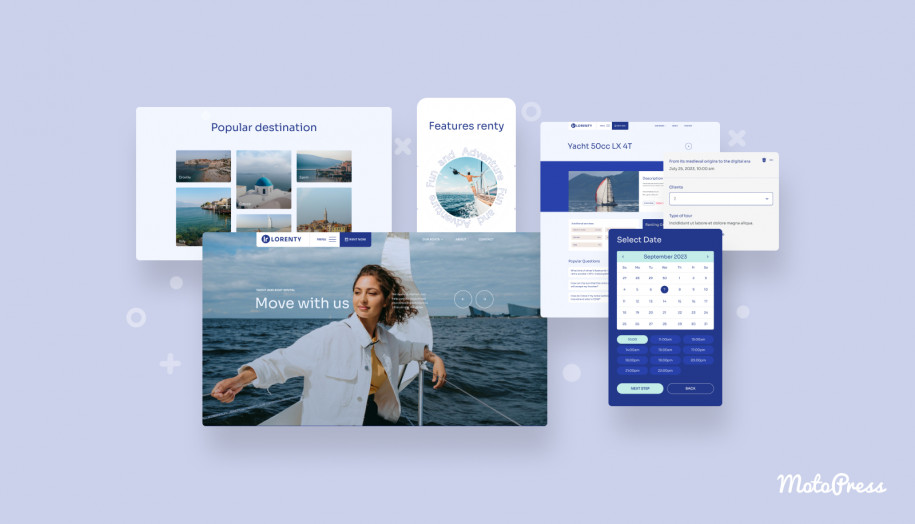
How to Start a Boat Charter Business
Are you wondering how to start a boat charter business? Do you want to avoid any troubles and complexities on the way to success? Or perhaps you are interested in the specifics of the boat rental industry? In any case, today’s article will tell you more about various ideas and ways of starting your own boat charter company, from planning your expenses to developing a suitable website.
Looking for a rental boat design and rental software included? Start with Lorenty !
What is a Boat Charter Business?
Before we dive into the possibilities this business offers, let’s explore what it includes. First of all, there are several types of services allowing you to rent a boat. They include bareboats and skippered charters. The latter offers a full crew or a skipper to handle the rented boat. Bareboat charter, on the contrary, provides just the boat for you to skipper. These services also include yacht charter providing a yacht for your clients.
According to recent research , the boat charter market is becoming more attractive every year to many customers and travel companies. The increasing number of marine tours and constant improvements in customer service make this industry appealing to small and medium travel-oriented businesses looking for new ways of increasing their revenue and new boating business ideas. Moreover, clients may be interested in booking your boats for a variety of reasons, such as:
- Boat rentals are affordable;
- No prior experience is required;
- Suitable for all kinds of travelers;
- Diverse types of available boats;
- A variety of destinations.
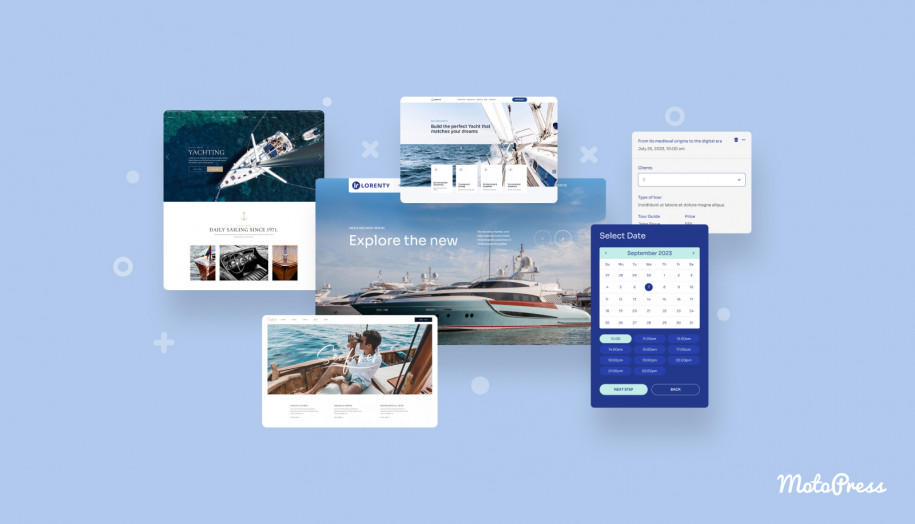
The Ultimate List of Boat Rental WordPress Themes

How to Build an Equipment Rental WordPress Website
Step 1: Choose the Right Boat Charter Business Idea
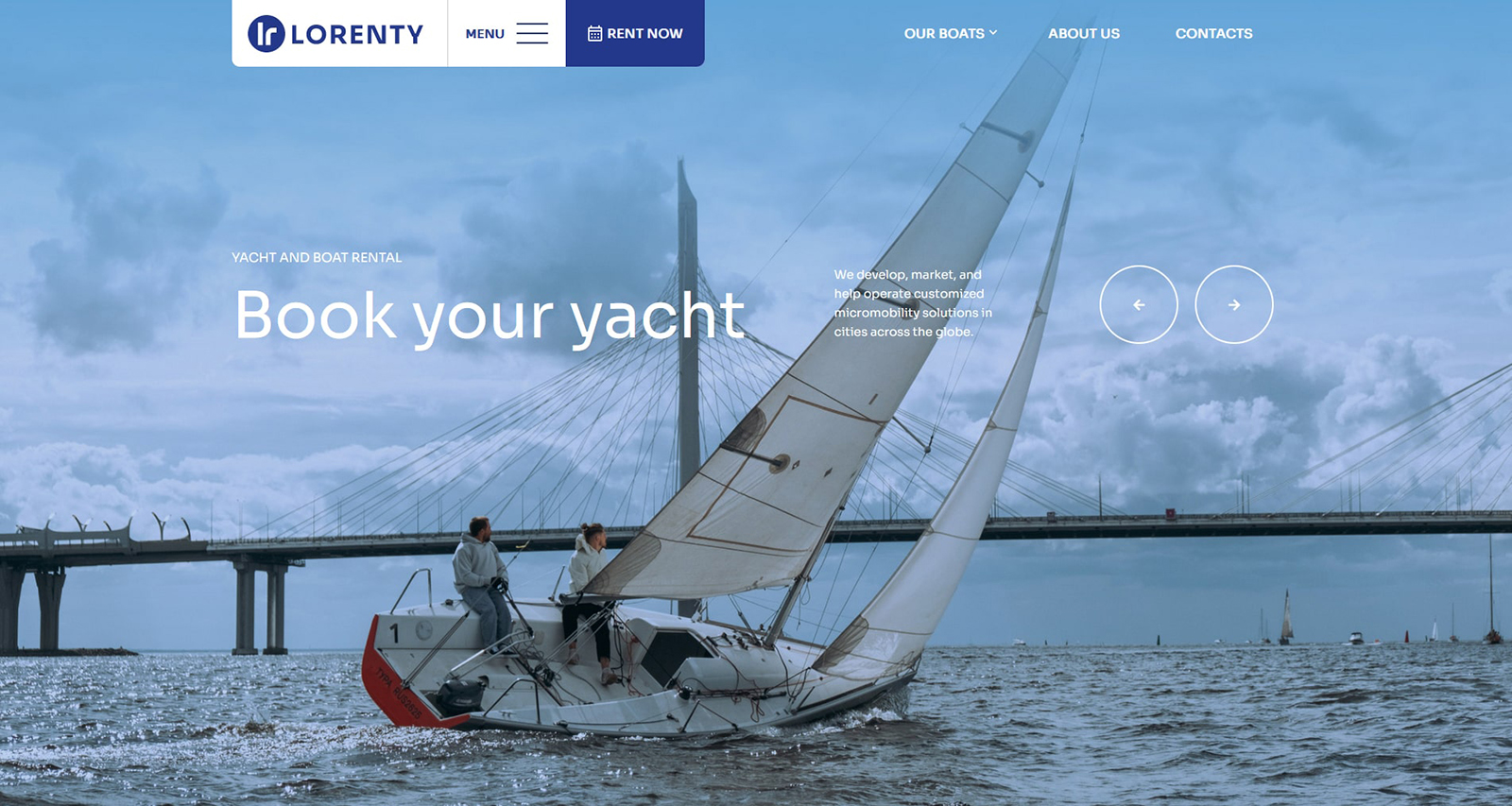
The idea you go for can often shape your business and even define its target audience. This is true for any business. However, with boat rentals, you can open new horizons to people who want to discover the world of sailing. There can be a diverse selection of ideas since boat rentals aren’t usually limited only to touristic purposes. They also include:
- Charter fishing;
- Peer-to-peer boat rentals;
- Family & dinner cruises;
- Rentals for scuba diving & snorkeling activities;
- Marine sightseeing & tours;
- Boat racing tournaments.
Step 2: Consider the Necessary Expenses for Your Boat Rental Company
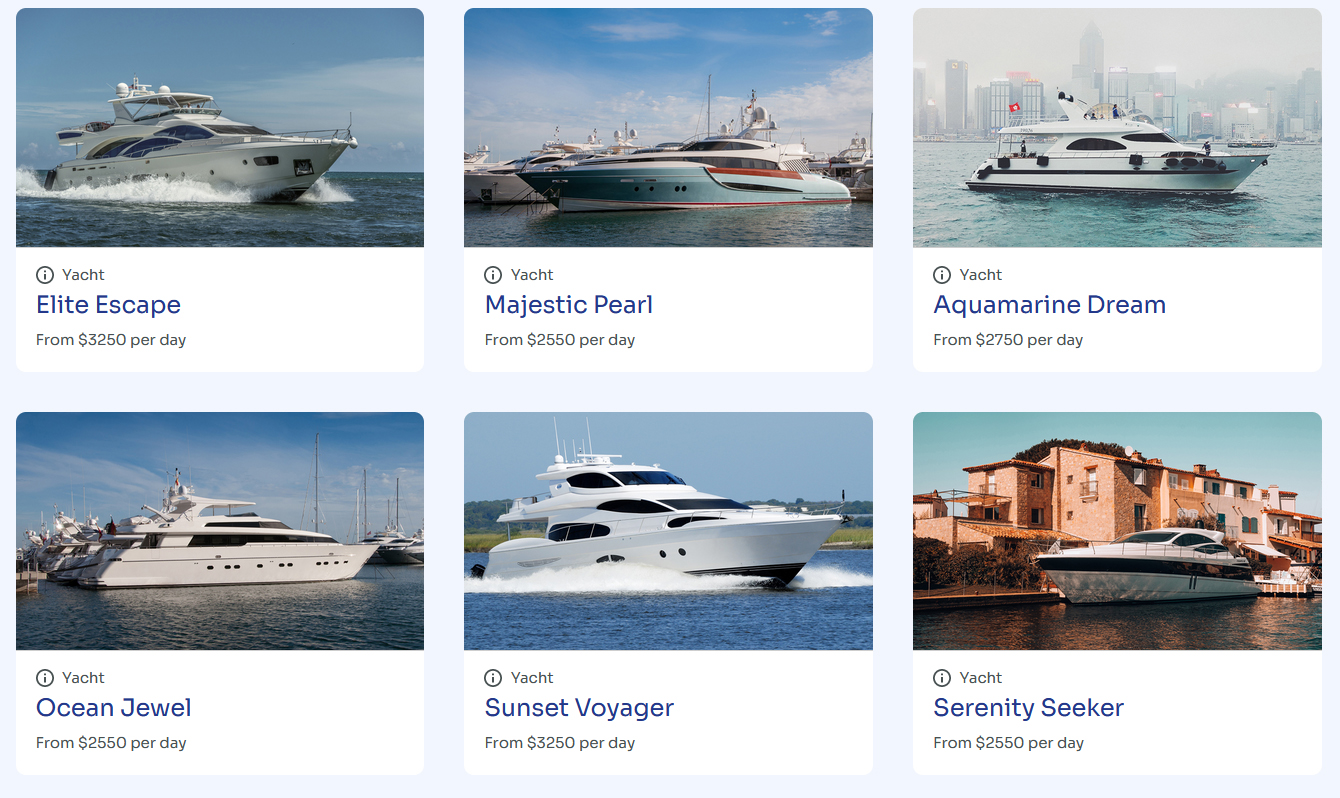
Needless to say, financial expenses play a considerable role in the successful establishment of your boat rental organization. And unfortunately, no business can have just a single type of payment to deal with. This is especially true when you need to know how to start a boat tour business. Here are the most frequent types of expenses your boat charter business may face:
- Boat purchase & insurance (avg. $50K);
- Charter and appointment software & technology (avg. $1.5k);
- Dock rental expenses (avg. $2K);
- Inventory & office equipment (avg. $2K);
- Advertising & marketing (avg. $3K);
- Website design & development (avg. $400);
- Employee salaries & training expenses (avg. $15K).
This is just an essential part of the expenses you may need to deal with as a boat charter business owner. With a diverse amount of expenses in different regions and countries, it is nearly impossible to know the fixed number of spending for your boat rental business in advance. However, you can easily calculate the estimated amount of expenses using the data stated above.
Step 3: Select a Suitable Location to Stay Competitive
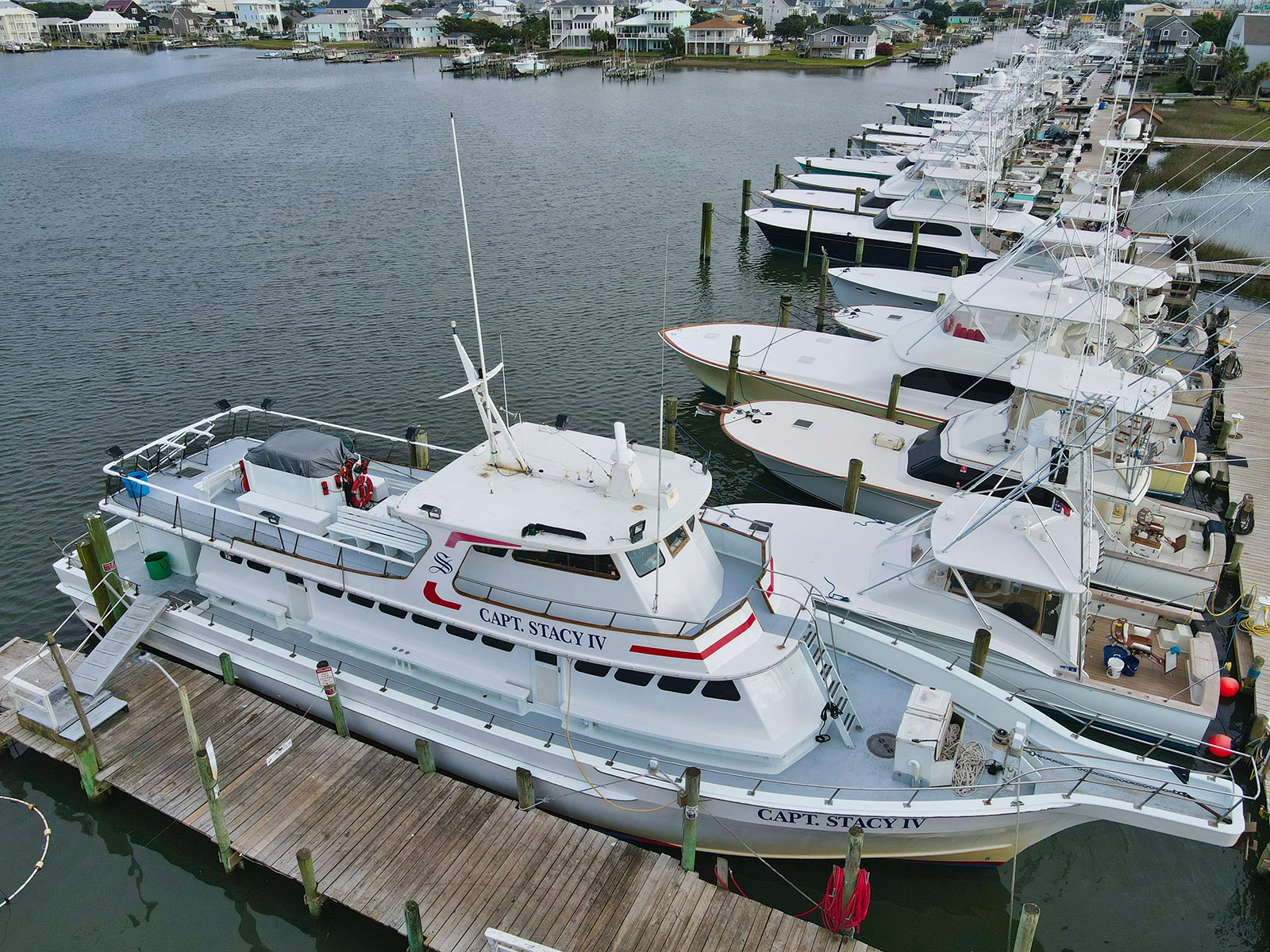
As a business owner, it is necessary to research popular locations and sailing routes before bringing your rental business to the market. There is a variety of possible options here that may help you find out how to start a boat business. Furthermore, the choice of location can impact your business’s future success. This influence can be both positive and negative. That’s why we recommend not to stop at a single option. Instead, you can choose several eye-catching destinations for your boat charter business, especially if you plan to scale your business later. For example, you may consider:
- Oceans & seas;
- Island coasts;
- Lakes, canals, and rivers;
- Locations for water sports & diving.
Step 4: Purchasing the Required Equipment

The most obvious choice for boat rental would be the boats themselves. Still, they make a part of what’s required for this business. You’ll also need to take care of any extra equipment to be rented & used during charters. Additionally, your job as an owner of the boat rental startup would benefit from using your tools for maintenance as well as other equipment, such as:
- Several boats of the appropriate style that fits your business vision;
- Office equipment to complete administrative & routine tasks;
- Equipment & furniture for serving food and drinks on board;
- Life vests, first aid kits, and various safety equipment for your customers and employees;
- Fishing rods, scuba diving equipment , bait, kayaks, and other activity equipment.
Step 5: Obtain the Permits and Licenses for your Boat Charter Business
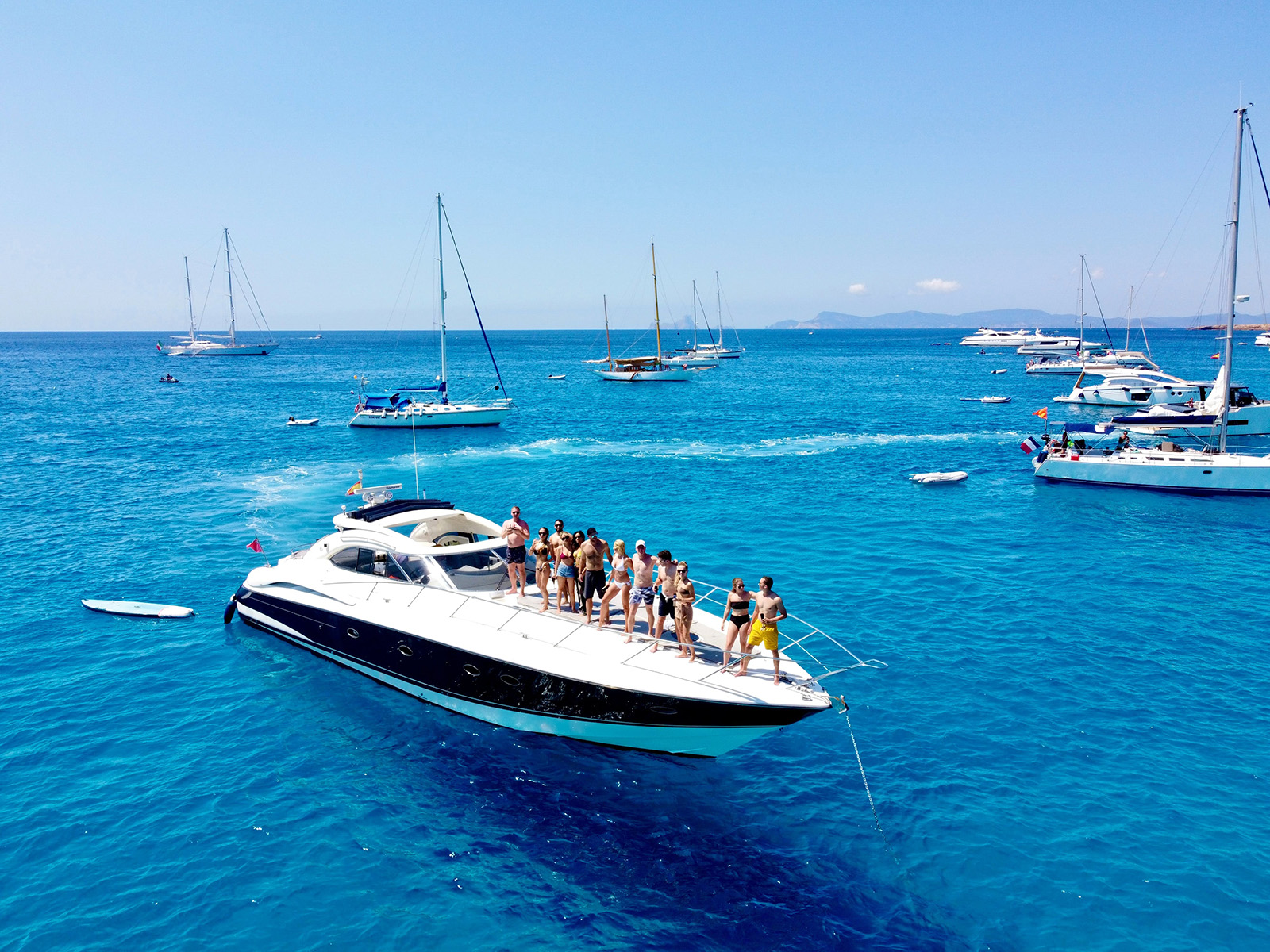
There are certain differences in various regions concerning licenses required for this type of business. However, there are also general permits that most businesses require. For example:
- Seller’s permit to allow collecting sales tax from your customers;
- Zoning approval to authorize building usage of your boat rental company;
- General business license (required for any business activity);
- Food service license for businesses that serve and deliver food ;
- Sign permit for advertising your business;
- Fire department approval to ensure your company’s office is allowed to install a fire alarm.
Permits differ from licenses in a certain way. For example, the latter are issued for a long term. This means they don’t need to be reviewed too often. Additionally, you may require professional licenses that may vary depending on the location of your business. Let’s take a closer look at them before learning more about how to start a boat rental business.
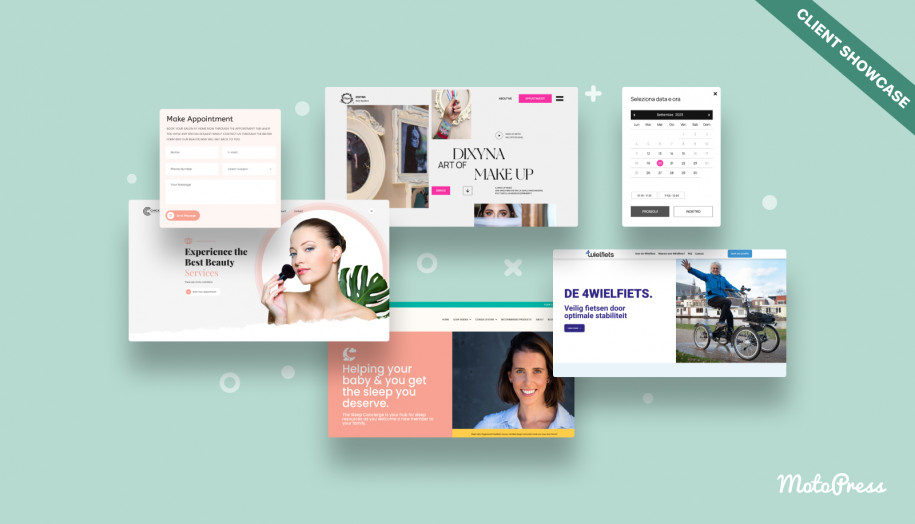
Websites Made with Appointment Booking Plugin: Customer Showcase
Boating Licenses and Their Differences Worldwide

Licenses for Boat Rentals in the US
In the US, only a few professional licensing documents are required for providing boat rental services. The first is the Captain’s License issued by the US Coast Guard . There are several variations of this document depending on what your business needs:
- Operator of Uninspected Passenger Vessels (up to 6 passengers);
- Master up to 100 Tons on Inland Waters/Great Lakes;
- Master up to 100 Tons on Near-Coastal Waters.
The Master license is a fitting choice for charters with more than six passengers in domestic waters. Moreover, the OUPV license is best for smaller groups of travelers with only up to 6 passengers as stated above. Using any or both of these licenses may be beneficial for learning how to start a party boat business. In some states, such as Florida, an additional saltwater charter license may be required if you want to offer boat fishing tours.
European Boat Charter Certifications
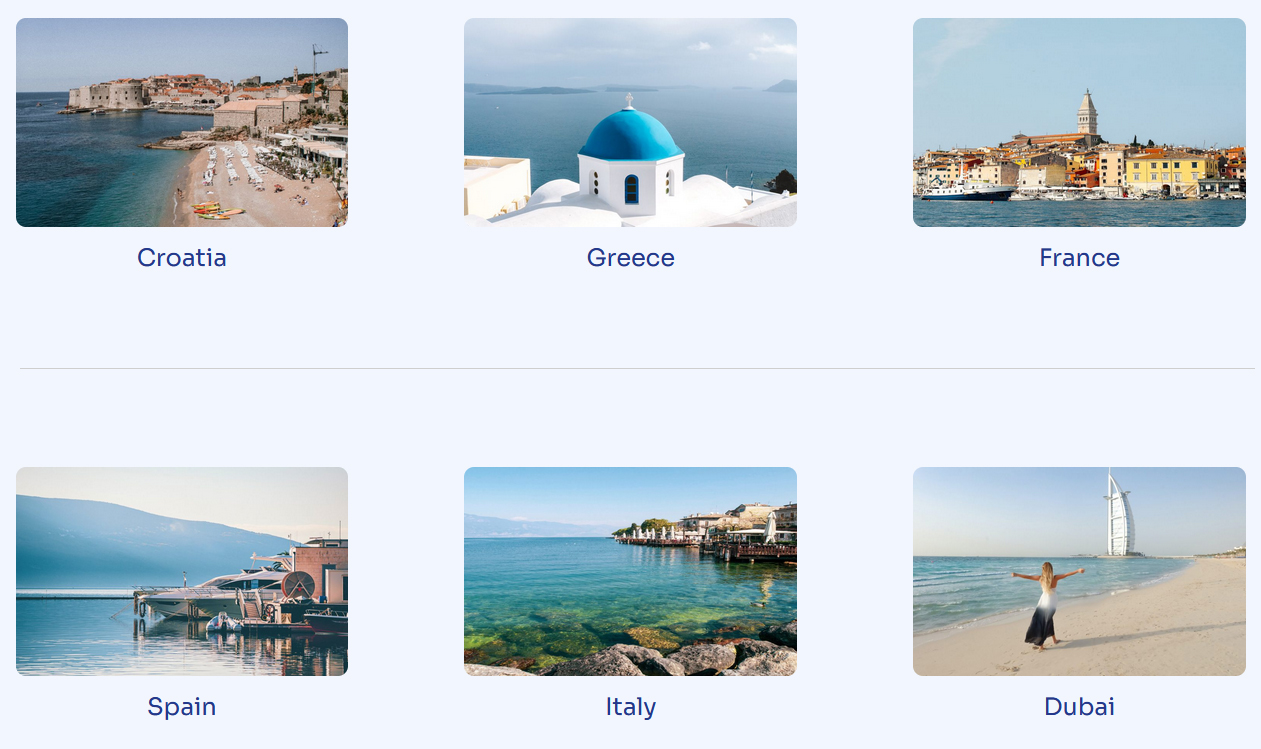
If you need to provide charters in European inland waters, such as lakes and rivers, a special test is required in addition to the ICC license. It is the CEVNI ( Code Europeen Des Voies De Navigation Interieure ) examination. Unlike the previously mentioned license, it is not commonly used in Europe, though most European countries require it.
Crucial Licenses for Boating in Asia

Unfortunately, there isn’t any universal licensing standard in Asia for captains and skippers who are looking for how to start a boat charter business. Still, diverse certifications are similar in different countries. In Japan, for instance, there are several classes of a Boat Operator’s License depending on the weight of vessels:
- First class;
- Second class;
Both First and Second class licenses are suited for vessels of up to 20 gross tons. However, the Second class allows navigating the vessel only within 5 nautical miles of a shore. Additionally, if your boat rental company provides personal watercraft, you’ll also need a PWC license.
Note that all of the previously mentioned certifications require certain training and experience. Luckily, most of the national organizations that offer these licenses also provide courses for everyone interested. So if you are a beginner learning how to start a boat tour business, attending these courses will be helpful.
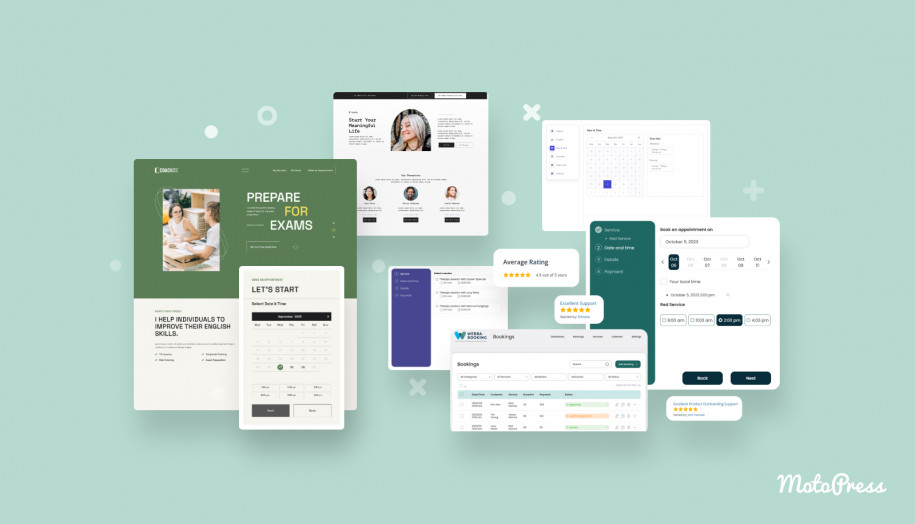
10 Free Booking Activities WordPress Plugins: Best Options
Step 6: Website Development to Advertise Your Boat Charter Business & Drive Bookings
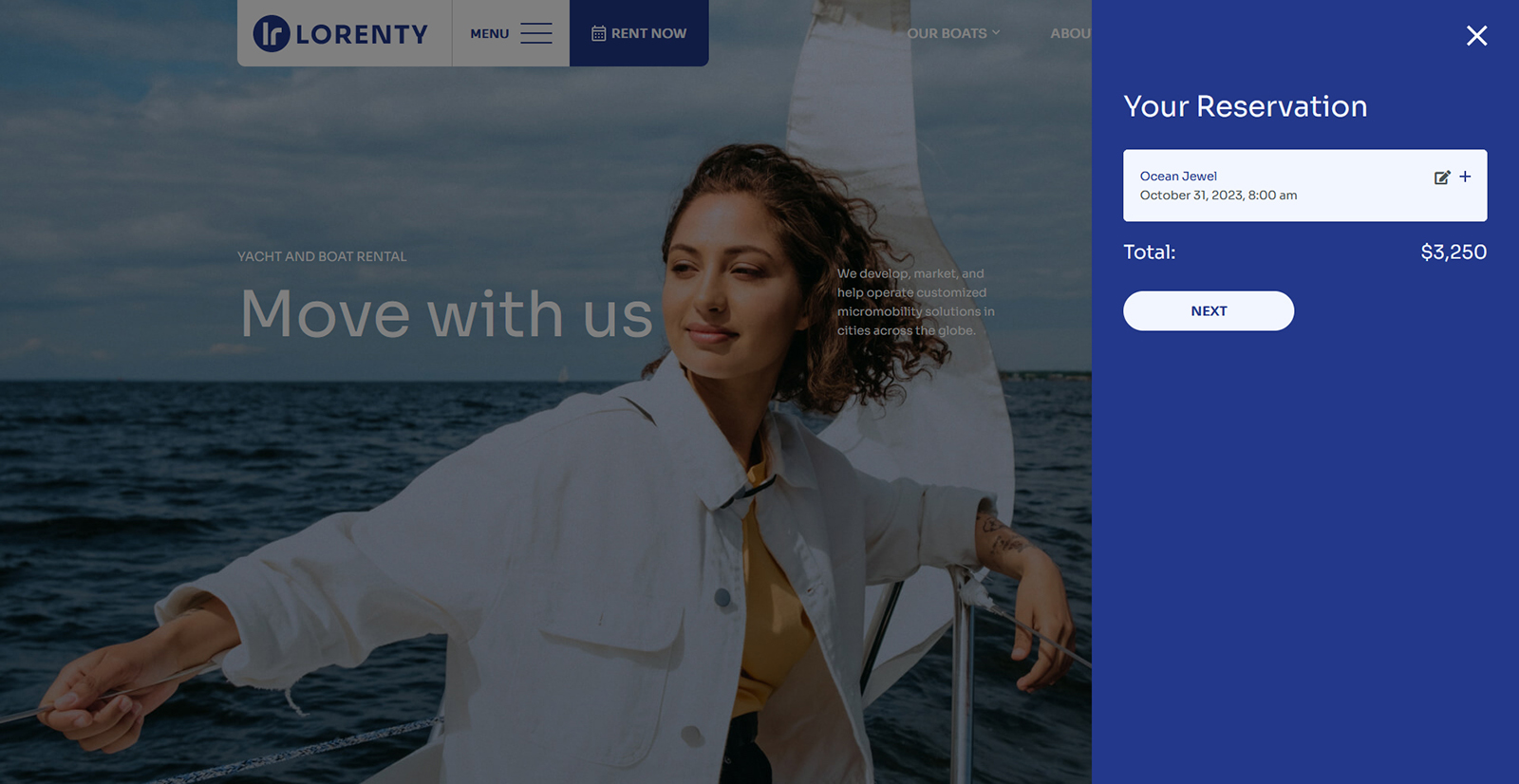
That’s why we recommend choosing ready-made solutions that save you both time and money. A great example is the Lorenty WordPress theme and its boat rental design in particular. It is a pre-designed theme that meets the needs of modern boat charter companies, such as for a party boat business. From choosing the right boat to booking it in a few clicks, Lorenty has everything you may need. Moreover, it has enough space for your content. This is possible thanks to the included Blog and Gallery pages. The theme also provides the following features:
- Clean & responsive design;
- Full-width homepage slider;
- 3 categories for motorboats, yachts, and sailboats;
- 2 pre-built layouts for the Destinations page;
- Pre-integrated boat booking widget for hourly or daily rentals;
- A variety of content elements made for the native WordPress block editor .
The abovementioned advantages are only a small part of what you get with this theme.
Lorenty also offers the built-in Appointment Booking plugin responsible for a smooth and easy-to-use online booking system allowing your clients to charter a boat in just a few clicks after pressing the “Rent Now” button. What’s more, you can set the capacity for every boat tour, enable clients to choose a location if you operate in many, and collect personal information to send automated messages.
Thanks to its rich functionality, this plugin allows you to easily control all charters and upcoming orders.
Besides, you can accept payments via Stripe , PayPal, and other gateways . As a result, you get a fully customizable and feature-rich theme for any of your boating business ideas. Feel free to use it and create something truly unique. It will help you drive your charter business and sales.
Watch a video to see how it works:
The Lorenty rental WordPress theme is available as a standalone product – or if you want to get all the extra functionalities and extensions, a Membership subscription can be a more attractive option. Lorenty is the best option if you are looking how to start boat rental business.
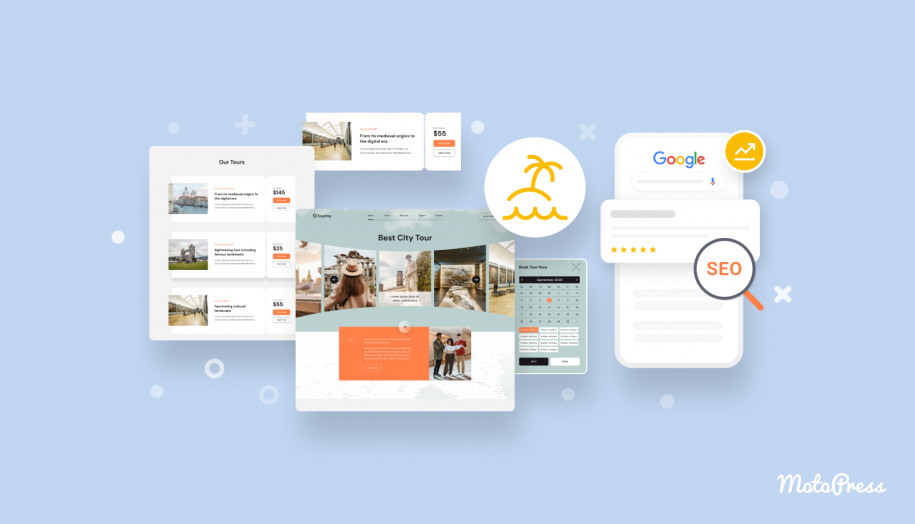
10 SEO Tips for Travel Booking Website
Wrapping Up

- Choosing an idea for your boat charters;
- Planning the expenses for various aspects of your business;
- Selecting a proper location that meets your business plan;
- Purchasing any necessary equipment and tools to keep your boats running and clients satisfied;
- Obtaining any necessary licenses and certifications for both your business and boat charters;
- Advertise your services to a larger amount of potential customers with a newly built website.
With these crucial steps, you’ll be able to lead your boat charter business to success. Besides, with our recommendations, you can easily transform it into a #1 location for fans of boating. Furthermore, a catchy design and abundant functionality of the Lorenty theme will provide outstanding benefits for your boat rental website. As a result, you’ll get a strong basis for your business’s further online development.
What is a charter boat business?
A boat charter business offers boats and yachts for rent. Unlike traditional boat rental services, boat charters provide a wider diversity of options. From bareboat charters to crewed ones, this type of business delivers great options for spending your time on yachts, with or without a professional crew.
How to start a party boat business?
To start a party boat business, it is necessary not just to take care of the boat itself but also some equipment and licenses. The latter include certain business permits as well as specific boat rental licenses depending on your location. Additionally, running such a business requires constant maintenance of your yachts and boats as well as diverse small expenses to ensure your customers get a positive charter experience.
What are the best boat business ideas for 2024?
There are lots of possible ideas for boat charter businesses in 2024. Some of them are the sale and rental of fishing vessels, boat repair & cleaning business, boat storage business, and recreational boat rental service. While some of these options are fitting for a newly established yacht charter business, others are great for an already successful company that is looking for new ways to grow or increase its income.
What is the cost of a boat renting business?
The cost of a boat rental business may vary, especially if we’re talking about renting yachts. On average, operating expenses per single boat may reach up to $5,000. From fuel expenses to marketing costs and various taxes, modern boat rental businesses need to keep track of various costs to ensure the profitability of boat rentals. However, with the right approach to management and marketing, they can always double their income due to constant growth in this business sphere.
What a yacht charter business plan must include?
Any business plan needs to include all important stages of your company’s development. This is also true for yacht charter businesses. From estimated startup costs to calculated profitability and operating expenses, a well-developed business plan outlines what it takes for a boat charter company to become and stay successful in the future.
Was this article helpful?
You have already left your review.
Yegor Yevsyukov
Content Creator
Yegor is an aspiring copywriter who is enthusiastic about modern web technologies. He likes creating informative and easy-to-read articles about the modern web.
Contribution Topics: WordPress themes
Social Networks: Twitter | LinkedIn
Related Posts
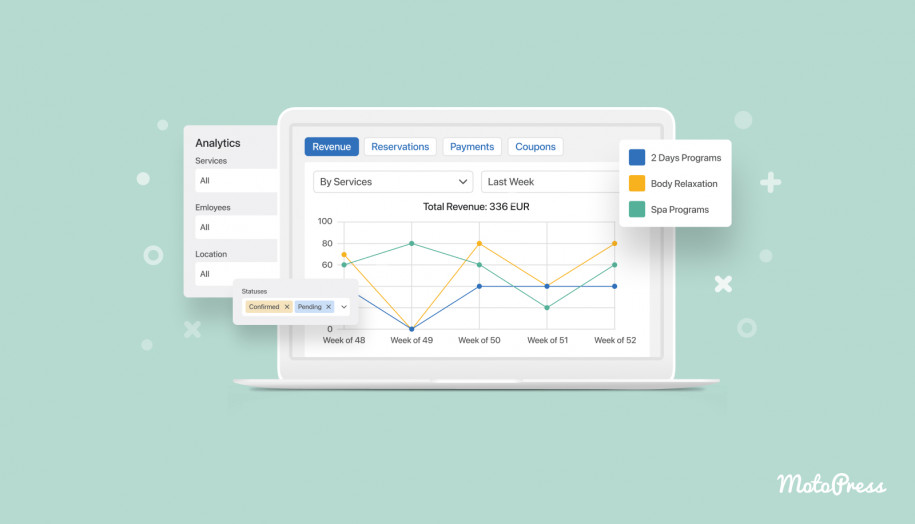
Visualize Your Business Performance with the New Analytics Dashboard (Appointment Booking 1.21.0)
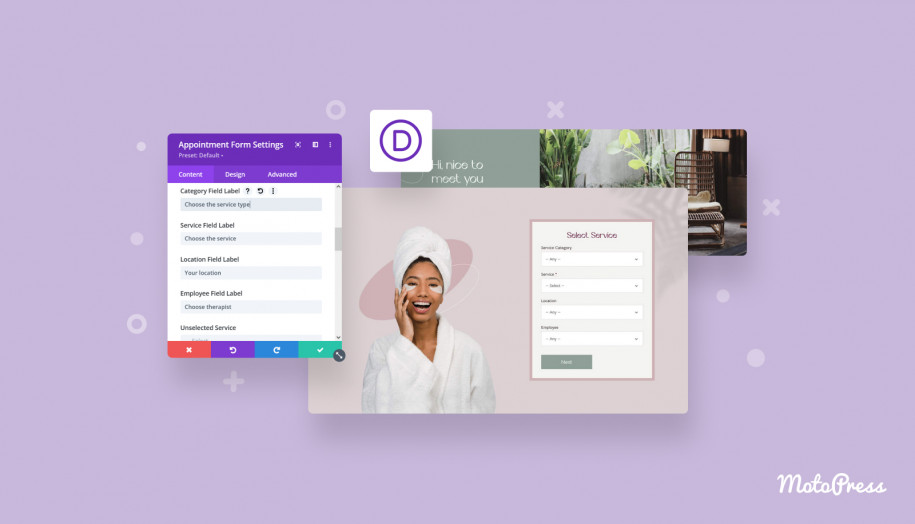
How to Use Divi Booking Plugin for Appointment Scheduling WordPress Website
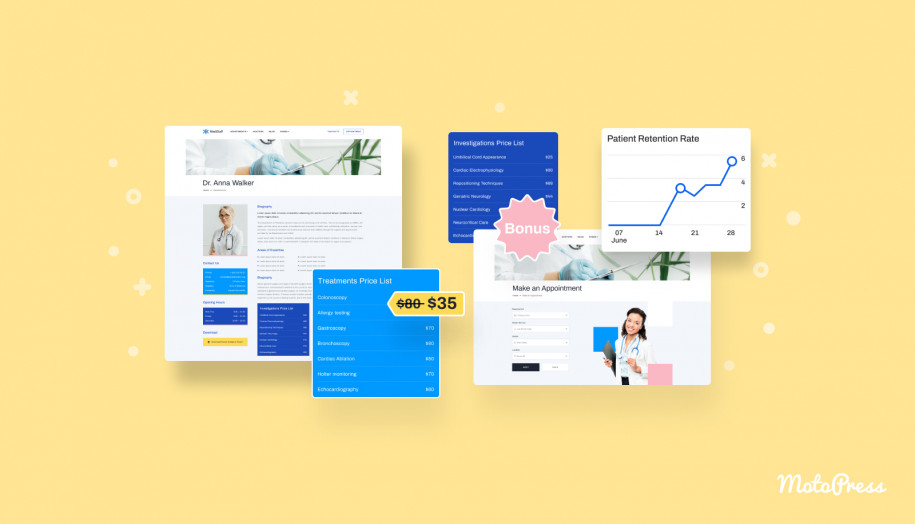
10+ Strategies to Increase Patient Retention Rate
Leave a Reply Cancel reply
Your email address will not be published. Required fields are marked *
- Weekly Newsletter
California's Boating & Fishing News

Ask a Maritime Attorney: What do I need to know about starting a chartering business?
I own a 50-foot sailing yacht and I would like to start a charter business. Our home port is Marina Del Rey, California and we would offer the boat for harbor cruises and for overnight trips to Catalina. What legal issues should I be concerned about before I get started?
A new charter business will need to address a lot of issues. Marina restrictions, passenger parking, liquor licenses, and a hundred other details must be considered. But the important legal issues can probably be divided into four main categories: The boat, the operator, city permits, and insurance.
Your first legal issue concerns the construction of the boat. The United States is one of many nations that protect its domestic transportation industries through “cabotage” laws. These laws require the transportation of passengers or cargo between U.S. ports to be performed aboard “U.S. flagged” vessels (vessels registered under the laws of the United States), and U.S.-built vessels.
Many sailing yachts in the 50-foot range in this country are foreign-built. A foreign-built vessel may not legally carry passengers for hire in this country unless the owner obtains a waiver of the restriction, or the operation is structured in a way that avoids the restriction through a “bareboat” charter (discussed below). Information regarding a waiver of the U.S. construction requirement is available on the internet web site of the United States Maritime Administration https://www.maritime.dot.gov/ports/domestic-shipping/small-vessel-waiver-program
If your boat is U.S. built or has a waiver, and it is 100 gross tons or less, you may carry up to six paying passengers (the limit is increased to 12 passengers for vessels over 100 gross tons) without the need for Coast Guard inspection. These are often referred to as “six-pack” or “twelve-pack” charters. A Coast Guard Certificate of Inspection will allow the carriage of more passengers, but compliance with the Coast Guard’s inspection standards is very expensive and conversion of an existing boat to an inspected boat is usually cost-prohibitive. Coast Guard inspection for passenger service also usually requires the assistance of an experienced marine architect and it should not be confused with the courtesy inspections conducted by the Coast Guard Auxiliary.
The next issue involves the operator of the vessel. The master of any vessel that carries passengers for hire must be licensed by the Coast Guard as a Captain, for the class of service in which the boat is operating. Further, since our reader is interested in operating overnight charters, the Coast Guard may require an additional licensed crew person to be aboard if the vessel will be underway for extended periods. Contact the Coast Guard’s local Marine Safety Office for information specific to your proposed operation.
Next, you will need to comply with local regulations for the harbor in which you will be boarding passengers. Many harbors charge a boarding tax for each paying passenger. Our reader is interested in running his operation out of Marina Del Rey, and he must therefore comply with a unique set of regulations established by Los Angeles County. The County has a handout that provides a good overview of the process that can be downloaded at https://file.lacounty.gov/SDSInter/dbh/docs/1028395_CharterBusinessHandout.pdf
And finally, our reader must consider the boat’s insurance policy and other forms of liability protection. Talk to your marine insurance broker about a charter policy. At a minimum, the policy must include an endorsement for the commercial operation of the vessel (most standard marine insurance policies exclude or limit coverage for these operations). The policy must also provide coverage for claims made by passengers, and “Jones Act” coverage for claims made by members of the crew. You may also want to consider corporate ownership of the boat as an additional level of liability protection, though this may give rise to other legal issues.
Some of the Coast Guard requirements may be avoided through a “bareboat charter” structure. A bareboat charter basically transfers ownership of the boat to the charterer during the term of the charter, but this brings a host of other restrictions, including a requirement that the charterer must select his or her own captain and crew.
These are a few of the basic legal concerns that must be considered by a boat owner who is considering a charter operation, but there are other issues to consider. For example, the charter market in Southern California is extremely competitive. The existing charter boat operators in any harbor are likely to scrutinize new operators who may be tempted to use a few “shortcuts” to get their business off the ground. Do your homework and hire an attorney who is experienced with these issues.
David Weil is licensed to practice law in the state of California and as such, some of the information provided in this column may not be applicable in a jurisdiction outside of California. Please note also that no two legal situations are alike, and it is impossible to provide accurate legal advice without knowing all the facts of a particular situation. Therefore, the information provided in this column should not be regarded as individual legal advice, and readers should not act upon this information without seeking the opinion of an attorney in their home state.
David Weil is the managing attorney at Weil & Associates (www.weilmaritime.com) in Seal Beach. He is certified as a Specialist in Admiralty and Maritime Law by the State Bar of California Board of Legal Specialization and a “Proctor in Admiralty” Member of the Maritime Law Association of the United States, an adjunct professor of Admiralty Law, and former legal counsel to the California Yacht Brokers Association. If you have a maritime law question for Weil, he can be contacted at 562-799-5508, through his website at www.weilmaritime.com, or via email at [email protected].
- ← Nearly 10,000 White Sea Bass Released from Channel Islands Harbor
- Port of Los Angeles Marine Flare Collection Event →
2 thoughts on “ Ask a Maritime Attorney: What do I need to know about starting a chartering business? ”
Two thoughts: Whether bareboat or crewed, use a charter broker who can guide you; don’t try to charter yourself, there are many pitfalls. 2nd, a 50 footer is on the cusp of bareboat & crewed yacht size, so could possible do either. Contact the Charter Yacht Brokers Association (CYBA) for advice, starting at https://cyba.net . Good luck!
This is a great intro to start thinking about running a charter operation in this harbor. You will definitely need to find out if you are allowed to load/unload passengers from your marina, OR if you will need to take the boat to Dock 55. It is busier than ever with charters in the harbor, and the Coast Guard, Sheriffs, LA County, and marinas are all watching for illegal charters. Best to do it right the first time, to avoid any legal issues, or a dangerous situation. Charters are a wonderful way to get more people on the water, and interested in boating! -Alicia Kunz, Marina Manager at Marina City Club
Comments Cancel reply
Your email address will not be published. Required fields are marked *
Your Thoughts are Appreciated
Save my name, email, and website in this browser for the next time I comment.
10+ Best & Profitable Boat Charter Business Ideas [2023]

By Nick Cotter Updated Feb 07, 2024

Our List of 10+ Best Boat Charter Business Ideas:
Luxury yacht charters, fishing charters, sightseeing charters, kayak and canoe charters, speedboat charters, sailboat charters, party boat charters, corporate event charters, cruising charters.
Hey there, future seafarer! We're about to embark on a thrilling voyage into the world of boat charter businesses. Picture yourself as the captain of your own ship, navigating the vast ocean of opportunities in the year 2023. Sounds exciting, right? Well, hold on to your captain's hat because we're not just talking about any boat business, but the most profitable and best ones out there!
Whether you're a seasoned sailor or a landlubber with a passion for the sea, this article is your treasure map. It's going to guide you through more than 10 incredible boat charter business ideas that are not only profitable, but also incredibly rewarding. So, are you ready to set sail towards success? Let's dive right in!
A luxury yacht charter refers to renting a yacht for a private and exclusive vacation experience. It provides a unique and memorable holiday that is unlike any other. Luxury yacht charters have been gaining popularity recently, and it's not hard to see why it would make an excellent business idea.
Here are a few reasons why:
- High Demand: There is an increasing demand for luxury yacht charters due to the unique and exclusive experiences they offer. People are looking for ways to escape from their busy lives and indulge in luxury vacations.
- Lucrative Market: The market for luxury yacht charters is one of the most lucrative in the travel industry. Charter companies can charge high prices for their services, and clients are willing to pay them for the experience they receive.
- Flexibility: Luxury yacht charters provide flexibility and freedom that is not possible with other vacation options. Clients can customize their itinerary, choose the destinations they want to visit, and enjoy the privacy and exclusivity of a private yacht.
- Repeat Business: Clients who have experienced a luxury yacht charter are likely to become repeat customers. These clients are loyal and are willing to pay for top-quality service and an unforgettable experience.
- Year-Round Business: Unlike other destination-based businesses that are limited to specific seasons, luxury yacht charters can operate year-round in different locations worldwide.
In conclusion, a luxury yacht charter business is an excellent idea for anyone seeking an opportunity in the travel industry. The market is growing, and the profits can be high, while offering a unique experience that fuses luxury and adventure.

Have you ever heard of a boat tour? It is an incredible experience that allows you to explore new destinations from the perspective of the water. If you want to take people on an unforgettable adventure, starting a boat tour business could be an excellent idea.
What is a Boat Tour?
- A boat tour involves taking people on a sightseeing tour on a boat.
- It can include a range of activities such as fishing, snorkeling, or even dining on board.
- The tour could be a few hours or several days long depending on the type of boat and target audience.
- Boat tours can operate on rivers, lakes, canals or even the sea.
Why Would a Boat Tour Business Make a Good Idea?
- Increased number of people looking for new, fun things to do and experience on vacation.
- The appeal of water activities increases with global warming.
- Ability to offer a unique perspective on nature, culture and history which cannot be experienced on land.
- Wide target audience ranging from people looking for relaxation to those looking for adventure.
- Boat tours can be tailored to a particular niche market e.g. sunset tours, whale watching tours or historical tours, depending on your area of expertise and target audience.

Examples of successful businesses:
The boat charter business industry provides customers with a range of options to explore destinations on the water. Below is a list of some successful companies in this environment.
- TrustedBoats
- SeaBreeze Charters
- Action Water Sportz
- FishHunter Charters
- Island Time Boat Charters</
If you love fishing, you might have stumbled upon the idea of starting your own fishing charter business.
- A fishing charter is a service that provides a boat with a captain and crew for people who want to go fishing for a day or more.
- The charter can offer a range of options, from deep-sea fishing to freshwater fishing, fly-fishing, and even coastal sightseeing.
- They also provide all the necessary equipment and bait, and usually, the customers don't need to have any fishing experience or gear – the charter will take care of everything.
- So why would a fishing charter make a good business idea? Here are some reasons:
- Low startup costs: You can start small with just one boat and expand as the business grows.
- High demand: Fishing is a popular activity, and many people would love to try it but don't have the means or knowledge to do it on their own.
- Seasonal business: Depending on your location, you can operate mostly during the fishing season and have the rest of the year off.
- Opportunities for upsell: You can offer additional services, such as catering, transport, or lodging, and increase your revenue.
- Hard work pays off: Running a charter business requires a lot of work, but if you're passionate about fishing and enjoy being out on the water, it can be a rewarding experience.
More resources:
If you're looking for a new business venture and enjoy being out on the water, considering starting a sightseeing charter may be a great idea. Not only can it provide a unique experience for tourists, but it can also be a fulfilling and enjoyable career for you.
- A sightseeing charter involves taking people out on a boat or other vessel to show them points of interest or natural beauty in a specific area, such as a coastline or a lake.
- Here are some reasons why starting a sightseeing charter may be a good business idea:
- It can be a fun and exciting way to work, as you'll be out on the water and helping people enjoy their vacation or leisure time.
- If you choose a popular tourist destination, you'll likely have a steady flow of customers during peak travel seasons.
- You can offer a variety of different tours, such as sunset cruises, wildlife watching, or historic tours, to cater to different interests and preferences.
- Starting a sightseeing charter business may not require a significant amount of initial investment, especially if you already own a boat or can lease one.
- You can set your own hours and work schedule, allowing you to balance your personal life with your business.
- If your business grows and becomes successful, you may have the opportunity to expand and offer additional services or tours, such as fishing charters or private events.
If you're an adventurous soul who loves spending time on the water, then starting your own kayak and canoe charter could be a great business idea for you. These popular outdoor activities are enjoyed by people of all ages, and offer a fun way to explore scenic waterways and wildlife.
- What is a kayak or canoe charter? A kayak or canoe charter is a service where individuals or groups pay to rent kayaks or canoes for a specified amount of time. This can be for a leisurely paddle down a calm river or for an exhilarating adventure through rapids.
- Why would it make a good business idea? There are many reasons why starting a kayak or canoe charter business could be a savvy and profitable decision. Here are just a few:
- The outdoor recreation industry is growing rapidly, with more people than ever before looking to spend time in nature and engage in physical activity.
- Paddle sports are a versatile activity that can be enjoyed by individuals, couples, and groups of friends or family.
- Kayaking and canoeing are relatively low-cost activities, making them accessible to a wide range of consumers.
- Charters can be designed for different levels of skill and experience, allowing businesses to cater to beginners, experts, and everyone in between.
- Consumers are often willing to pay a premium for high-quality equipment and guided tours, which can increase your profit margins.
- What are the potential challenges? As with any business, there are potential challenges and risks associated with starting a kayak or canoe charter. Before jumping in, it's important to consider factors such as:
- The cost of equipment, insurance, and permits/licenses
- The need for knowledgeable and experienced guides
- Weather conditions and water levels that can impact safety and scheduling
- Compliance with local laws and regulations
- Marketing and advertising to attract customers and stand out from competitors
Overall, a kayak or canoe charter business can be an exciting and lucrative venture for entrepreneurs with a passion for paddle sports and outdoor adventure. By carefully considering the potential benefits and challenges, you can make an informed decision about whether this business idea is right for you.
Related business ideas:
Have you ever envisioned yourself gliding across the blue waters, enjoying the wind in your hair, and feeling free? There's no better way to experience this than by renting a speedboat. As exciting as it sounds, it's not always possible for people to buy their speedboats. They often turn to speedboat charters for that ultimate adventurous experience. In simpler terms, a speedboat charter is the act of renting out a speedboat, complete with a licensed captain, to customers for a fixed period. It has become an attractive business opportunity for entrepreneurs who want to combine their passion for boating with a commercially viable venture. Read on to find out why.
- Low Startup Costs
Starting a speedboat charter business does not require significant capital investment compared to other industries. In most cases, all you need is a single speedboat, a captain, safety equipment, and insurance. This reduces the startup costs by a significant amount, making it a profitable business idea for budding entrepreneurs.
- Flexibility
This kind of business allows you to be flexible when it comes to managing your charter business. You can decide when and where you want to operate, giving you the freedom to tailor your services to the market's needs. Furthermore, since you control your time, you can decide when to work, making it an ideal business for people who prefer a flexible work-life balance.
Speedboat charters are seasonal, and their peak season usually runs from Memorial Day to Labor Day in the United States. This means that you have the option to work only during the peak season and relax during the off-season. This flexibility allows entrepreneurs to explore other business ventures in the off-season or take a break altogether while earning a decent income throughout the summer.
The appeal of a speedboat charter service has likely increased due to the COVID-19 pandemic. Many Americans are seeking alternatives to crowded resorts and busy tourist attractions. Speedboat charters offer a unique way to escape the hustle and bustle, either alone or with friends and family. With this increased demand, there is an excellent opportunity for entrepreneurs to capitalize on this trend.
Have you ever dreamed of sailing the open blue sea, with the salt of the ocean spray in your hair and the wind in your sails? Well, with a sailboat charter business, you can make those dreams a reality for others!
- A sailboat charter is a rental service where customers pay to use a sailboat for a set amount of time, typically a day or a week.
- Charter companies often provide fully-equipped boats, crew, and even meals depending on the package.
- Chartering a sailboat is a great way for people to experience the joys of sailing without buying and maintaining their own vessel.
- A sailboat charter business can appeal to a variety of customers, from seasoned sailors looking for a new adventure to groups of friends or families seeking a unique vacation experience.
- The demand for sailboat charters is high, especially in coastal areas and popular vacation destinations.
- Sailboat charter businesses can also offer additional services, such as sailing lessons or guided tours, to increase their revenue streams.
- With the rise of eco-tourism and sustainable travel, sailboat charters offer a great way for travelers to reduce their carbon footprint and experience the beauty of the ocean in a responsible way.
If you're thinking about starting your own business in the tourism industry, party boat charters could be a great option. Here's why:
- Unique Experience: Party boat charters offer a unique experience for vacationers and locals alike. They provide the opportunity to see a destination from a different perspective and enjoy a fun-filled day on the water.
- High Demand: With so many people looking for exciting ways to celebrate special occasions, party boat charters are in high demand. From birthday parties to corporate events, there are plenty of opportunities to generate income.
- Flexible Business Model: One of the great things about starting a party boat charter business is that you can operate on a part-time or full-time basis, depending on your schedule and preferences. You also have the option to offer different types of tours, like sunset sails or snorkeling adventures.
- Low Overhead Costs: Compared to other businesses in the tourism industry, party boat charters have relatively low overhead costs. You don't need a physical storefront, and since your boat is your primary asset, maintenance and repair costs will be your biggest expense.
- Easy to Promote: Marketing a party boat charter business is relatively straightforward. You can build a website to showcase your tours, create social media accounts to attract potential customers, and partner with local hotels and tour operators to generate referrals.
Do you want a unique and unforgettable corporate event that your colleagues, clients and employees will be talking about for years to come? Look no further than corporate event charters!
- What are corporate event charters?
A corporate event charter is a private, customized boat rental for corporate events on water. This can include parties, team building events, meetings, and celebrations.
- Why would it make a good business idea?
Here are some reasons why corporate event charters are a great business idea:
- Memorable Experience: A corporate event charter is a unique and memorable experience that will set your event apart from all others. Your guests will feel special, appreciated, and will be excited to attend again in the future.
- Customized Itinerary: You can customize your event on water itinerary, entertainment, food and refreshments. This flexibility is unparalleled and ensures that you can create the perfect vibe and experience for your corporate event.
- Stunning, Relaxing Views: Water views are some of the most beautiful sights to behold. Imagine your team building, meetings or celebration in the middle of the water with the radiant sunsets or the beautiful sunrise and seashore.
- Effortless Planning: Charters are all-inclusive, meaning that everything is taken care of for you: from tables, chairs, catering, crew, drinks, and entertainment, and so much more. This ensures a stress-free and effortless planning process.
- Great for team building: Sailing together is fantastic for team building. It builds leadership, communication, and trust among coworkers who may not have had the chance to work together before. With private charters, you will have a chance to really bond with your colleagues in a relaxed, scenic environment.
If you want to make your next corporate event exciting and unique, consider a corporate event charter on water. It's an unforgettable experience you won't regret.
Have you ever dreamed of owning a yacht but couldn't justify the cost? Or maybe you're an experienced sailor looking for a new and exciting venture? Either way, a cruising charter business might just be the perfect business idea for you.
- A cruising charter is essentially renting out a yacht, with or without the captain and crew, to guests for a period of time.
- Charter guests can enjoy exploring new destinations, trying out different water activities, relaxing onboard, and sharing unforgettable experiences with friends and family.
- The cruising charter business can cater to a wide range of clients such as honeymooners, families, corporate getaways, and even celebrity guests.
- Maintaining a fleet of yachts requires significant investment and ongoing costs, but a successful cruising charter business can generate significant revenue to offset these expenses.
- The best part? You get to share your passion for sailing and the ocean with others, creating personalized and unforgettable experiences that customers will cherish for years to come.
Overall, a cruising charter business can be a profitable and rewarding venture for the right entrepreneur. With the right business plan and approach, you can turn your love for sailing and the ocean into a successful and fulfilling career.
More helpful resources about LLCs:
I'm Nick, co-founder of newfoundr.com, dedicated to helping aspiring entrepreneurs succeed. As a small business owner with over five years of experience, I have garnered valuable knowledge and insights across a diverse range of industries. My passion for entrepreneurship drives me to share my expertise with aspiring entrepreneurs, empowering them to turn their business dreams into reality.
Through meticulous research and firsthand experience, I uncover the essential steps, software, tools, and costs associated with launching and maintaining a successful business. By demystifying the complexities of entrepreneurship, I provide the guidance and support needed for others to embark on their journey with confidence.
From assessing market viability and formulating business plans to selecting the right technology and navigating the financial landscape, I am dedicated to helping fellow entrepreneurs overcome challenges and unlock their full potential. As a steadfast advocate for small business success, my mission is to pave the way for a new generation of innovative and driven entrepreneurs who are ready to make their mark on the world.
Boat As A Business Program
Work with us it doesn’t cost you anything extra.
Catamaran Guru has been at the forefront of developing and operating the “Yacht As A Business”, or for us, “Catamaran As A Business” concept. We have not only advocated it to our clients, but have personally benefitted from this program. We found that most yacht owners use this program as an avenue to acquire the cruising catamaran of their dreams for retirement at a huge discount. Others, like ourselves, use the yacht charter revenue together with the business tax deductions to reduce the costs of owning a very nice yacht that we enjoy now.
Catamaran Business Ownership
Watch our in-depth interview with one of our yacht-as-a-business boat owners. He shares details and his experience about owning a charter yacht and working with Catamaran Guru. He is candid about how the yacht charter business program he chose is working for him and talks openly about the challenges of charter boat ownership, tax advantages, actively managing the business, and his first year revenue and profits.
You, too, can work with Catamaran Guru to discover the pitfalls and get expert advice when you work with us.
What Is A Yacht or Boat Business?
The tax benefits must be carefully planned and documented to make sure that the business activity can withstand scrutiny. There are very specific rules and requirements that need to be complied with in order to meet the standard of actively operating a business for profit and taking tax advantages.
The goal is to structure your boat business in such a way that you have the intent and ability to make a profit! What you CANNOT do, is structure this business with a flawed business plan of “limited charter” and purposely run it at a loss to avoid wear and tear on your boat while offsetting the cost of ownership with business tax deductions. You CANNOT “pretend” to be in business! However this program, when done correctly, offers the least expensive alternative to own a boat!
How to Set up a Boat as a Business
This is a very basic overview of how to set up a boat business and qualify for tax advantages. Before you make the decision to purchase a yacht, consult with us to figure out if this scenario will be suitable for your situation. There are many things to consider. We can discuss all scenarios with you and tailor the program for your personal situation.
- Figure out the size, type, and configuration of boat you plan on buying
- Decide on the destination or location you want to operate from
- Establish a business purpose – education charter, dive and adventure charters, exclusive luxury charter etc.
- Figure out what your expected revenue and expenses will be
- Create a business plan
- Create a business entity like an LLC or other pass-through entity for your business
- Plan your tax strategy. The business tax advantages should directly offset the income from your boat business activity as well as the taxable income from any other active source including your regular job (W2 income). Our business plan highlights the tax advantages available to you through the yacht as a business plan. That way you can adjust your withholding and use the tax advantages to offset cash flow immediately!
- Consider your ultimate goals and exit strategy and plan for it
- Create a marketing plan for your business – website, social media, introduce your boat to charter brokers, attend boat shows
- Charter management – It is best to team up with a management company to help manage your boat and establish a clientele if the boat is in the Caribbean or Bahamas
You can purchase your yacht to your specifications including an owner version layout, set the yacht up as a business, operate it with the help of a charter company anywhere in the world, and have your yacht at least partially or fully paid off at the end of the contract period by applying business revenues and tax advantages.
But do not be fooled. You cannot dump your yacht in a charter fleet for 5 years while collecting a guaranteed monthly income. This is deemed “passive income” and does not qualify you for the section 179 rule and tax advantages. Once your “Yacht As A Business” is set up correctly, you stand to benefit greatly from this concept, but it does require work on your part.
What Is Section 179 Business Tax Deduction?
People seem to think that the Section 179 deduction is some complicated tax code, but really it is not. Essentially, Section 179 of the IRS tax code allows businesses to deduct operating expenses and depreciate the qualifying equipment purchased or financed during the tax year. Typically, when a business buys new equipment, the purchase price can be depreciated using the MACRS scale which is an accelerated depreciation schedule.
The original target of this legislation was much needed tax relief for small businesses – and millions of them are actually taking action and getting real benefits. So, if you are in the market for a new yacht, the Section 179 rule should definitely be a part of your yacht-buying strategy.
According to this law, when used as part of a business, you can legitimately divert some of the taxes that you’re already paying into the sailing vessel. This in turn, creates equity in your new yacht. Therefore, buying a new yacht and placing it in charter service as a business, makes total sense to reduce cost of ownership and turn tax advantages into an investment. It is vitally important the business is set up correctly and the operation is structured to qualify for the tax benefits and remain in compliance going forward.
Understanding Section 179 Business Tax Deduction
*The U.S. Congress has halted the Section 179 roller coaster of the past recent years by making the Tax Deduction limit permanent. The limit was raised to $1,160,000. This is good news for yacht businesses, as the owners and their tax advisers now know early in the year that the deduction will be there for them and they can plan accordingly.
Section 179 Tax Deduction Limits for year 2023
Deduction Limit: The maximum deduction for equipment purchased/financed and placed in service by 12/31/2023 is $1,160,000. Businesses can deduct the full cost of equipment as an expense.
Limit On Equipment Purchases: Business owners may spend up to $4,050,000 on equipment, new or used, and claim the full Section 179 deduction. Beyond that amount, the deduction is reduced dollar-for-dollar. This stipulation is to ensure that small businesses, not large corporations benefit from the deduction. For 2022, this spending cap for equipment is $2,700,000.
Example Of Section 179 At Work
To take advantage of the 2023 deductions, you must purchase or finance the equipment and place into service by 12/31/2023. Form 4562 covers this deduction
Equipment Purchases:
First Year Write-Off: ($1,160,00 max 2023)
80% Bonus Depreciation Deduction:
Normal First Year Depreciation: (20% in each of 5 yrs on remaining amount)
Total First Year Deduction: ($1,160,000 + $32,000 + 0)
Cash Savings: ($1,192,000 x 35% tax rate)
$417,200
Lowered Cost Of Equipment After Tax Savings
*The above information is an overall, “simplified” view of the Section 179 Deduction. For more details on limits and qualifying equipment, please contact us directly about the variety of yacht ownership programs we can help you evaluate.
Bonus Depreciation from 2023
Bonus depreciation comes into play if the Section 179 limit has been reached. The 100-percent depreciation will stay in effect until January 1, 2023, when the first-year bonus depreciation deduction will decrease as follows:
- 80% for property placed in service during 2023
- 60% for property placed in service during 2024
- 40% for property placed in service during 2025
- 20% for property placed in service during 2026
TWO YACHT OWNERS IN THESE PROGRAMS, GIVE THEIR PERSPECTIVES
Co-management business program with guaranteed income, yacht as a business program, crewed yacht charter opportunities.
- Recover taxes paid in past years to offset the cost of the yacht purchase. Learn more about Yacht as a Business & Tax Advantages .
- Cover all the costs of ownership including the mortgage payments with income and tax advantages – the boat pays for itself!
- Enhance your lifestyle with owner use of the vessel and enjoy the pride of ownership
- All models available in this program
- Virgin Islands, Bahamas and USA locations
- “Owner Operator” option available for those who want to make a career change and be involved full time
Learn more about our Crewed Yacht Programs >> Interested? Give us a call 1-804-815-5054 or email us.
WORK WITH OUR YACHT OWNERSHIP SPECIALISTS
How can catamaran guru’s team help you.
If you are a US tax payer, enjoy sailing and yachting, and want to own your own yacht at a substantially reduced cost, this program will work for you. Catamaran Guru’s team will work with you and your tax professional to qualify your “Yacht Business” to legitimately take advantage of tax deductions available to you. Although the acquisition of a new yacht may be an effective business tool to take advantage of these tax rules, the tax benefits must be carefully planned to make sure that it can withstand scrutiny.
- We guid e you on your selection of the yacht to purchase and advise you through the buying process
- This business yacht ownership program is designed for flexibility to enable the owner to choose various yacht models and layouts including owner suite in some cases, upgraded equipment, multiple worldwide locations and flexible owner use. We will guide you to make a good choice to suit your individual goals.
- Once you’ve decided on a yacht to purchase, we will help you set up your “Yacht As A Business” and structure it to comply with IRS tax rules. This will ensure that all allowable business tax deductions, advantages and yacht charter income, will largely cover the cost of boat ownership.
- We will help you find a placement with a suitable charter management company. We have extensive experience in the charter management arena and will make sure that you and your charter company is compatible. In our experience, yacht charter management together with active participation by the owner is a great way to reduce the cost of yacht ownership. It is the perfect opportunity for anyone looking to own a new yacht at a substantially lower cost!
When You Work With Our Team
- You get the most complete yacht ownership program available, including a 5-year projection, tax schedule, and business plan
- We show you how to set up your yacht charter business to be in compliance with current tax laws.
- We guide you on how to qualify for tax advantages that can offset your ordinary income.
- We familiarize you with the current tax laws and how they apply to your particular situation.
- We discuss and plan your exit strategy
- We guide you if you choose to upgrade to a larger yacht within this structure
- We show you how to make your yacht be part of your retirement plan.
- We help you understand the difference between a Charter Company Guaranteed Income Program (passive) and Yacht As A Business program (active participation)
We Work With Top Catamaran Brands and First-Tier Charter Companies
- Catamaran Brands: Catamaran Guru can offer you access to some of the top brands of yachts in the world like Fountaine Pajot , Lagoon , Bali Catamarans , Xquisite Yachts , and others.
- Charter Companies: We offer the added luxury of making it possible for you to place your new yacht into service at charter bases in multiple locations around the world through affiliations with reputable charter companies like Catamaran Charters , Dream Caribbean Blue , Virgin Islands Yacht Charters , Cruise Abaco and others
The Catamaran Guru is a brand-independent yacht brokerage working with various charter management companies and yacht brands to bring our boat-buying clients the programs and boat models that are best for their situation and goals. Catamaran Guru is no longer affiliated with Dream Yacht (DYC).
Contact Us For a Consultation
There is a lot of information in these pages as we tried to make it as comprehensive as possible. But there is a lot to absorb so you may need someone to help you sort through it all. Plus there are always questions that deal specifically with your personal situation.
Contact us for a comprehensive consultation. Our services come FREE if we represent you during your yacht-buying process.
CALL 804.815.5054
BUSINESS YACHT OWNERSHIP REFERENCE MATERIALS
Faq & common misconceptions about yacht ownership.
We find that explaining what this program entails is easier for yacht owners, their accountants, and other financial advisors, if some common misconceptions and questions are addressed. This list gives a clear and uncomplicated picture of the program. Read more about yacht ownership facts and fiction .
How To Set Up A Yacht Business To Comply With Tax Laws
There are many things to consider and we give you a basic overview of how to qualify for tax advantages. Before you make the decision to purchase a yacht, consult with us to figure out if this scenario will be suitable for your situation. We will advise you on what size yacht you qualify for and what charter company will work for you in which location. We can discuss all scenarios with you and tailor the program for you and your family.
- How to set up your Yacht Business
- How To Operate A Legitimate Yacht Charter Business
- Track Your Business Activity with the Harvest App on Your Mobile
Section 179 Deduction Explained
This article explains exactly how section 179 works and how it affects boat owners. Read more about Section 179 deductions for boat businesses .
Compliance Issues For A Legitimate Yacht Charter Business
While there are many skeptics and detractors to operating a yacht as a small business, we know that if it is done correctly, with a sincere intent to create a small business, which will either be profitable in the short term or in the long term through a paid-off asset acquisition, it is the correct business strategy for a yacht owner to reduce the cost of ownership. Read more about overcoming yacht charter business compliance issues .
Charter Boat Owners Win IRS Challenges
The number one objection from CPAs is that our business yacht management program is a passive activity and will not be deemed active participation. They contend that it can be very difficult for a boat owner to prove active participation in a boat business and qualify for small business and section 179 tax deductions. However, in 2015, a couple won their case in Tax Court on passive vs. active participation. Their success validates the model that Catamaran Guru uses when advising boat buyers regarding charter boat ownership.
- Read more about the IRS case and how this charter boat owners won
- And for another court case discussing material participation in a boat business, see Kline vs IRS .
Section 179 Tax Advantages & Related Court Cases
We have seen many yacht businesses operated in charter programs very successfully around the world as small businesses by our clients. Offsetting the cost of ownership is a sound business strategy especially in the yacht charter business. However, there are many regulatory challenges to a yacht charter program, including complex tax laws, IRS regulations, active participation rules, profit motive and other business considerations. The Court cases below illustrate the tax implications of yacht charter operations. Read about boat business tax advantages .
BUSINESS YACHT OWNERSHIP SUCCESS STORIES
- sailluna.com : Luna is a Lagoon 450 SporTop that operates in the Caribbean as a crewed charter yachts in the BVI.crewed yacht. Nim and Fabiola are one of our great success stories and is one of the most popular
- catamaranguru.com : Our own previously owned catamaran, Zuri , a Lagoon 450S, was in the program in the U.S. mostly doing instructional charters and exhibits at boat shows and demonstrations for prospective buyers.
- sailallende.com : This Fountaine Pajot Helia 44 is in Crewed Yacht charter in the BVI. This young couple is making big waves in the industry with exceptional service and have become leaders amongst their fellow crewed boat crews. Kristiann and Graham are also heads the CCCYA, the only industry representative specifically for term charter yacht owners, owner-operators and yacht owners’ representatives in the Caribbean.
- BigNauticharter.com : Big Nauti is a Bali 5.4 that operates luxury crewed charters in the BVI. It is one of the most fun boats to charter!
- Belle Vie : Belle Vie is a Bali 4.8 and broke all records in her first year of charter in 2020. Owners Greg and Christina, operates the boat as a business in crewed charter and is doing extremely well.
- Dream Caribbean Blue : Greg and Christina (owners of Belle Vie ) have done so well that we have invited them to become part of this community becoming one of our boutique yacht charter management company partners . They serve a clearinghouse for many of our boats in the USVI and offer a complete and comprehensive yacht management service. They manage many of our 44ft to 54ft crewed boats in business. Check them out!
- ftmcharters.com : The Voyage 500 and her crew/owners is one of the most successful crewed boats in the BVI with numerous awards for excellence!
- irishroversailing.com: UPDATE, RETIRED. This Fountaine Pajot Lipari 41 operated between Annapolis in the summer and the Bahamas in the winter as a very successful bareboat business. They have completed their five years in the program and is now operating a sailing school out of New Jersey.
Boat Business Ownership Resources
- Section179.org
- Section 179 Tax Deduction Calculator
- Form 4562 covers this deduction
- Overview of Tax Relief Act Of 2010
- Full Text of Tax Relief Act Of 2010, H.R. 6467
- Checklist for Vessel Purchase
- Active vs. Passive Activity
- Section 168
- Boat as a Second Home
*This information is general in nature and purchasers are encouraged to seek experienced legal counsel in yacht acquisition planning and implementation. Catamaran Guru is not a licensed tax attorney or CPA and is not qualified to give legal advice, but we can put you in touch with experts who are.
testimonials
More charter management tips, charter boat owners win irs challenge.
Charter Boat Owners Win IRS Challenge The number one objection from CPAs is that our business yacht management program is a passive activity and will
Yacht Charter Management Programs Explained
Placing a yacht into charter management is a good way to reduce the cost of the boat and also offset the cost of ownership. There
Interview with Catamaran Owner in Business Program
https://www.youtube.com/watch?v=AIQJVebHPIkWe have received so many questions about operating a yacht as a business, so we interviewed one of our catamaran owners in this program currently.
We're Ready, Let's Talk.
For more than 30 years, we have been a part of the catamaran community and created Catamaran Guru™ to encourage and educate all the aspiring sailing out there. We understand the dream of traveling the world by catamaran and created a one-stop-shop to make that dream a reality for you.
- Stephen & Estelle
- Testimonials
Get Started
- Yacht Sales
- Used Yachts
- Charter Management
- Boat as Business Programs
- Seminars & Events
HOW TO START A DAY CHARTER BUSINESS: Part 1
Preparing a profitable business plan.
Perhaps you are eager to exit the 9 to 5 grind. Maybe you’re looking for a lifestyle change – or just a change of pace. Perhaps it’s an opportunity to be your own boss.
Whatever your reason for wanting to start your very own day charter business, we applaud you. Who wouldn’t want to spend their days on the water, meeting friendly holidaymakers, making new friends and doing what makes you happy? But what can appear at first to be a long off dream, we can make a reality – and sooner than you may think.
The 1160 Resort from Seawind Catamarans carries up to 43 guests. Learn more about this successful charter model
PREPARING TO SUCCEED
Before getting too excited about the prospect of handing in your notice and jumping in head first, you will want to run through some of the basic fundamentals that you need to cover in order to successfully launch your new business. In the charter world it’s absolutely true to say, failing to prepare is preparing to fail. Therefore, get organized, do your homework and prepare to succeed! Create a document with your business plan and address all of the queries raised in the following sections. This article should help you identify and highlight all of the critical questions you will need to ask yourself in evaluating the feasibility of this business venture.
Any good yacht broker will be able to help you through this process. It makes sense to start talking to a broker sooner rather than later as they will have inside information on the market, and have realistic expected returns readily available. They will also be able to offer support and connections with charter booking agencies. These agencies supply your initial customer base and are a vital component in the startup stage.
SPEAK TO A DAY CHARTER SPECIALIST TODAY
STAGE ONE: Do I want this?
If you are reading this, then this first step is one you may have already taken. However it is probably the most important stage in this process and worth formally evaluating again. Ask yourself, do I really want to be doing this? You’ll probably answer yes, of course, why not… right? But too few charter companies understand and consider that this is a serious business. It will be a lot of fun and a very exciting adventure but at times it will also be a lot of hard work and you will regularly be tested mentally and physically.
STAGE TWO: Assess the market
Where do you want to start your day charter business? Why? Is there a demand for day charter in this area? Are there other areas that would perform better? These are the questions to be asking yourself in this stage. Consider things such as historical tourism trends, and where charter guests come from. Are they out of town visitors, cruise guests or locals looking to party on the water. How much are others charging in the area, how many charters are they running per year?
STAGE THREE: SWOT analysis
Using the information you have developed in stage two create a SWOT analysis . If you do not have previous experience using the SWOT (Strengths, Weaknesses, Opportunities, Threats) tool, we highly recommend running through this exercise to analyze the local tourism/charter industry to discover how you can be competitive and offer value to your charter guests. Learn more about SWOT analysis
STAGE FOUR: Offer differentiation
What will you offer, and how does this set you apart from the competition? Don’t be afraid to be different! Will your guests be swimming? Will you offer dive tours? Are dinner cruises an option? Will you target the upper end of the market? if so you will need to match your offering to these requirements. Or will you be competing on cost, targeting backpackers and budget holiday makers? What is currently available and how can you provide a competitive advantage?
STAGE FIVE: The nuts and bolts
- OperationModel including: length of season, trips per day, average passenger load, multiple locations depending on the season.
- Day-to-Day operation: Hired skipper or self-skipperd, crew roles, and customer service. Will crew assist with handling the boat, entertain the guests, serve guests or all of the above?
- Launch Date – it can take 6-12 months to build a new charter boat to match your unique requirements! Seek advice from the shipyard, and take advantage of their expertise when equipping a boat
- Licensing / local authority issues – your local yacht broker should know the local market and provide valuable insights. Locate your local charter expert
- Marketing / booking systems – Charter booking agencies and tour agencies will be vital in the initial stages of your operation. Have your broker provide you with these contacts and connections so you can lay some groundwork before the arrival of your vessel.
When delving deeper into this list, consider how will you find and attract guests, and especially how they will book and pay. Will you be using a booking agency to manage this? Do you have a business model that handles guests for the whole day? Do you have beach access and launch access for small boats and maintenance arrangements for larger boats? Will you do your own accounting or hire someone to do this for you? Will marketing be in house or outsourced? These are all extremely important questions to include in your business plan. You will need to address each of these in order to successfully launch your new day charter business.
STAGE S IX: Return on Investment Calculation
Having proceeded through the previous stages and given the information you have now gathered, create a profit and loss prediction on your day charter company. The most critical aspect to the overall result of this calculation is the initial outlay on the boat(s) and the maximum number of passengers – these are the figures you will not have control over. The number of trips per day/week/season, the cost per head, etc are all variables you may be able to adjust later to suit changing market conditions. You can download an example of a profit and loss calculation for the Seawind 1160 Resort HERE . In this example we have based our calculations on an operation in Phuket, Thailand.
Don’t forget why you are doing this! to have fun and earn a living doing what you love. It may be beneficial to run through these steps a number of times as you work on your plan and develop your figures.
Get in touch with one of our charter specialists to learn how to begin, prepare and successfully complete your journey into charter business ownership today! Still unsure? Send us an email with any questions you have about what your next steps should be and how to determine if this is the right choice for you.

MORE RELATED ARTICLES
HOW TO START A DAY CHARTER BUSINESS: Part 2
The 1160 Resort in action and in service
For more information, please click here:
Ask a question
Leave a Reply Cancel reply
Your email address will not be published. Required fields are marked *

IMAGES
VIDEO
COMMENTS
Use a peer-to-peer boat rental platform to list your boat (s) or fleet. Easy secure peer-to-peer or commercial boat insurance, for peace-of-mind to protect yourself and your boats from potential damages and liability. Create a listing for your boat (s) or charter (s), including price, location, images, description, and other relevant details.
Step 2: Mentorship. If you're new to the charter boat business, it's a good idea to set up a mentoring partnership with an established company. With a business mentor by your side, you'll get the valuable assistance and expert instruction you need to take you from a struggling neophyte to a consummate professional.
Step 8: Apply for Licenses and Permits. Starting a charter boat business requires obtaining a number of licenses and permits from local, state, and federal governments. The US Coast Guard requires boat owners who run a charter to have a captain's license.
1. Perform market analysis. Starting a boat charter business requires a thorough understanding of the market to ensure your venture meets customer needs and stands out among competitors. A comprehensive market analysis will provide valuable insights into the industry, potential customers, and competitive landscape.
Steps. 1. Create a business plan that lays out your ultimate goal for your yacht charter business. You then need to determine how you plan on reaching your goal. Your business plan will also answer questions, such as the size of yacht you plan on managing, the destinations you wish to charter and the type and size of clientele groups you want ...
12. Buy or Lease the Right Charter Boat Business Equipment. When starting a charter boat business, you will need to purchase or lease certain types of equipment. This equipment includes: 1. A Boat. Obviously, your charter boat business will need a boat! You can either purchase or lease a boat, depending on your budget and needs. 2. Fishing Gear
Traditionally, a marketing plan includes the four P's: Product, Price, Place, and Promotion. For a charter boat business plan, your marketing strategy should include the following: Product: In the product section, you should reiterate the type of charter boat company that you documented in your company overview.
In this post, we'll cover everything you need to know to start your own charter boat business: •Determining the type of charter boat business you want to run •Obtaining the proper licenses and permits •Purchasing or leasing a boat •Recruiting a crew •Marketing your new charter boat business •Tips for keeping your customers happy and building a loyal base of clients
Below, we step prospective boat entrepreneurs through broad steps on how to start their own boating business! 1. Ensure That Your Market Is Right. If you live in an area where the weather is bad for nine months out of the year, a charter boat business isn't going to be viable. The same is true if you don't get any tourists in your area.
By starting a boat charter business, you offer people the chance to share the wonderful experience of being on the water, and all that it has to show. Keep a clear focus on the kind of experience ...
Ocean Champion Charter Co. is a charter boat company in Los Angeles. In business for over 50 years, Ocean Champion Charter Co. offers bareboat charter rentals to experienced sailors in the area. Sailors can choose from a large fleet of charter boats including yachts, sailboats, motor boats, and catamarans in multiple models and sizes.
You need to be able to show your boat and voyages to a large audience, not just a specialist market of keen sailors. The Classic Sailing team have never seen fellow charter boats as competition. They welcome more beautiful boats taking new people out on the water, it all helps build the market place, like Hay on Wye being full of second hand ...
And unfortunately, no business can have just a single type of payment to deal with. This is especially true when you need to know how to start a boat tour business. Here are the most frequent types of expenses your boat charter business may face: Boat purchase & insurance (avg. $50K); Charter and appointment software & technology (avg. $1.5k);
A new charter business will need to address a lot of issues. Marina restrictions, passenger parking, liquor licenses, and a hundred other details must be considered. But the important legal issues can probably be divided into four main categories: The boat, the operator, city permits, and insurance. Your first legal issue concerns the ...
10+ Best & Profitable Boat Charter Business Ideas [2023] In 2023, discover the best and most profitable ways to start a boat charter business! From party boats to eco tours, we've rounded up over 10 great business ideas for you. Dive in and find your perfect fit today! By Nick Cotter. Updated Feb 07, 2024.
However, you can follow the following basic structure when writing a business plan for your boat charter company: 1. Cover Page. Pretty self-explanatory, but don't underestimate the importance of having a well-designed cover page. The cover page should be attractive for your readers while fitting your company's image.
Create and optimize profiles on relevant social media networks. Run contests and giveaways to build awareness and generate buzz. Consider investing in relevant paid social media advertising options. Reach out to relevant influencers (i.e., in the travel niche), so they can help promote your boat tour business.
In this video, I showed How to Start an LLC for Boat & Yacht Charter Business in 2023 with complete business registration and state formation process online....
Catamaran Business Ownership. Whatever your reason, Catamaran Guru's team of experts can set up your yacht charter business in compliance with tax authorities to suit your individual financial and personal goals. Watch our in-depth interview with one of our yacht-as-a-business boat owners. He shares details and his experience about owning a charter yacht and working with Catamaran Guru.
If you're trying to figure out how to start your own boat business, here's three creative ideas to get you started. 1. Offer your own watersports adventures. Say you want to target families with kids for a day of wake sports. You can outfit your boat with kid-size life jackets, kid-size water skis, kid-size wakeboards and similarly kid ...
From attaining the perfect boat and making it a legal charter, to obtaining the necessary licenses and performing local market research, we cover all the essential aspects of starting a business. Our comprehensive financial planning and operations management sections ensure that you are fully equipped to manage the business side with confidence.
In the charter world it's absolutely true to say, failing to prepare is preparing to fail. Therefore, get organized, do your homework and prepare to succeed! Create a document with your business plan and address all of the queries raised in the following sections. This article should help you identify and highlight all of the critical ...
The cost to start a charter boat business in Florida can vary widely depending on several factors, such as the type of boat, equipment, licenses, permits, insurance, marketing, and operational costs. However, some general estimates suggest that starting a charter boat business can range from $50,000 to over $1 million, depending on the size and ...
Here are the basic steps you'll need to accomplish to start a fishing charter business: Get the required U.S. Coast Guard license. Obtain a guide's license for the state you live in, if necessary. Obtain the appropriate insurance. Buy the gear necessary to run fishing charters. Set up the business entity.
Incumbent mayors in the Cassowary Coast, Aurukun, Burdekin, Cherbourg, North Burnett, Charters Towers, Mornginton Shire, Wujal Wujal and Maranoa were also under pressure as counting continued. An ...
Start the day smarter. Get all the news you need in your inbox each morning. ... Thriller Speedboat Tour and Midnight Sun Boat Charters, the company that lists a private boat named the Obelix on ...